

House of Travel Insurance

Compare House of Travel Insurance
To compare House of Travel insurance policies with those from other providers on Canstar’s database, follow the link below.
Compare Travel Insurance
What types of travel insurance does house of travel offer.
House of Travel has partnered with Allianz to offer comprehensive insurance cover for its travel clients.
House of Travel has eight travel insurance plans on offer:
- Plan A: Essentials Plus
- Plan B: Premier
- Plan C: Non-residents Incoming to New Zealand
- Plan D: Permanent One-way From New Zealand
- Plan E: Multi-trip
- Plan F: Domestic Cancellation
- Plan G: Domestic Essentials
- Plan H: Residents Returning to New Zealand
What’s covered by House of Travel’s Plan A: Essentials Plus policy?
Plan A is available as a single or family package. Both options come with unlimited overseas emergency medical assistance and hospital expenses.
- $400 per person for overseas dental expenses
- $1500 for continuing medical expenses on return to New Zealand (per person)
- Accidental death cover of $50,000 for singles/$100,000 for families
- Permanent disability cover of $50,000 for singles/$100,000 for families
- Cancellation cover of $10,000 for singles/$20,000 for families
- $4500 for rental vehicle insurance excess
- Up to $2.5 million for personal liability
- Additional expenses up to $50,000 for singles/$100,00 for families
- Alternative transport expenses of $5000 for singles/$10,000 for families
What’s covered by House of Travel’s Plan B: Premier policy?
Plan B is also available as a single or family package. It covers everything that Plan A covers, often with higher compensation, plus extra areas including: dental expenses on return to New Zealand and loss of income.
- Resumption of journey cover of $10,000 for singles/$20,000 for families
- Cancellation cover of $100,000 for singles/$200,000 for families
- Travel delay expenses of $2000 for singles/$4000 for families
- Accidental death cover of $75,000 for singles/$150,000 for families
What’s covered by House of Travel’s Plan C: Incoming to New Zealand Non-residents policy?
Plan C is available for non-residents travelling to New Zealand. Policy holders will receive unlimited overseas emergency medical and hospital expenses, plus cover for additional situations. The policy can be taken out for singles or families.
What’s covered by House of Travel’s Plan D: Permanent One-way From New Zealand policy?
Plan D is available for those moving to New Zealand permanently. This policy can be taken out for singles or families. Singles will be eligible for up to $250,000 for overseas emergency medical and hospital expenses. Families will be eligible for up to $500,000 for the same cover.
What’s covered by House of Travel’s Plan E: Multi-trip policy?
Cover is available under Plan E Multi-trip if all of the following apply:
- You are a resident or temporary resident of New Zealand; and
- You have purchased your policy before commencing your journey; and
- Your journey commences and ends in New Zealand
Policy holders are entitled to unlimited overseas emergency medical and hospital expenses. Other cover includes death, disability, cancellation and personal liability.
What’s covered by House of Travel’s Plan F: Domestic Cancellation policy?
Plan F provides cover for domestic travel cancellation only. Singles are eligible for cover up to $10,000 and families are eligible for cover up to $20,000.
What’s covered by House of Travel’s Plan G: Domestic Essentials policy?
Plan G provides cover for those travelling domestically. Plan G’s policy covers cancellation, personal liability, rental vehicle insurance excess and more.
What’s covered by House of Travel’s Plan H: Residents Returning to New Zealand policy?
Plan H provides cover for New Zealand residents who are overseas and ends when they arrive at any immigration counter in New Zealand.
Plan H provides comprehensive cover for residents and includes unlimited cover for overseas emergency medical and hospital expenses, personal liability, cancellations and additional expenses.
Optional cover available for most plans includes:
- Increased item limits
- Increased rental vehicle insurance excess cover
- Special activity packs
About House of Travel
Established in 1987, House of Travel has grown to be the largest privately owned travel company in New Zealand and the third largest travel organisation in the Asia Pacific region.
Currently House of Travel employs more than 2000 staff across 75 travel stores across the country.
Written by: Caitlin Bingham | Last updated: November 23, 2023
Other Travel Insurance from
House of Travel
Southern Cross
Compare Outstanding Value Travel Insurance
Compare Travel Insurance By Destination
Outstanding Value Travel Insurance Awards
Canstar's Best Value Travel Insurance NZ

Wise: the Best Travel Money Card in New Zealand

Do I Need Travel Insurance to Visit Australia?

Quick Links
The best travel insurance policies and providers

It's easy to dismiss the value of travel insurance until you need it.
Many travelers have strong opinions about whether you should buy travel insurance . However, the purpose of this post isn't to determine whether it's worth investing in. Instead, it compares some of the top travel insurance providers and policies so you can determine which travel insurance option is best for you.
Of course, as the coronavirus remains an ongoing concern, it's important to understand whether travel insurance covers pandemics. Some policies will cover you if you're diagnosed with COVID-19 and have proof of illness from a doctor. Others will take coverage a step further, covering additional types of pandemic-related expenses and cancellations.
Know, though, that every policy will have exclusions and restrictions that may limit coverage. For example, fear of travel is generally not a covered reason for invoking trip cancellation or interruption coverage, while specific stipulations may apply to elevated travel warnings from the Centers for Disease Control and Prevention.
Interested in travel insurance? Visit InsureMyTrip.com to shop for plans that may fit your travel needs.
So, before buying a specific policy, you must understand the full terms and any special notices the insurer has about COVID-19. You may even want to buy the optional cancel for any reason add-on that's available for some comprehensive policies. While you'll pay more for that protection, it allows you to cancel your trip for any reason and still get some of your costs back. Note that this benefit is time-sensitive and has other eligibility requirements, so not all travelers will qualify.
In this guide, we'll review several policies from top travel insurance providers so you have a better understanding of your options before picking the policy and provider that best address your wants and needs.
The best travel insurance providers
To put together this list of the best travel insurance providers, a number of details were considered: favorable ratings from TPG Lounge members, the availability of details about policies and the claims process online, positive online ratings and the ability to purchase policies in most U.S. states. You can also search for options from these (and other) providers through an insurance comparison site like InsureMyTrip .
When comparing insurance providers, I priced out a single-trip policy for each provider for a $2,000, one-week vacation to Istanbul . I used my actual age and state of residence when obtaining quotes. As a result, you may see a different price — or even additional policies due to regulations for travel insurance varying from state to state — when getting a quote.
AIG Travel Guard
AIG Travel Guard receives many positive reviews from readers in the TPG Lounge who have filed claims with the company. AIG offers three plans online, which you can compare side by side, and the ability to examine sample policies. Here are three plans for my sample trip to Turkey.
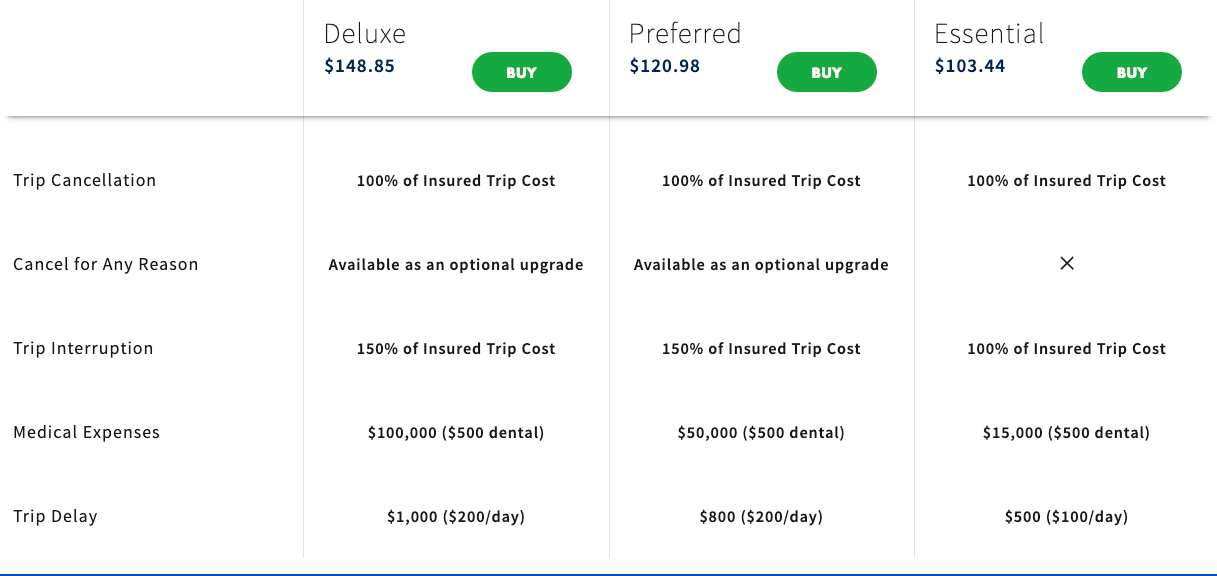
AIG Travel Guard also offers an annual travel plan. This plan is priced at $259 per year for one Florida resident.
Additionally, AIG Travel Guard offers several other policies, including a single-trip policy without trip cancellation protection . See AIG Travel Guard's COVID-19 notification and COVID-19 advisory for current details regarding COVID-19 coverage.
Preexisting conditions
Typically, AIG Travel Guard wouldn't cover you for any loss or expense due to a preexisting medical condition that existed within 180 days of the coverage effective date. However, AIG Travel Guard may waive the preexisting medical condition exclusion on some plans if you meet the following conditions:
- You purchase the plan within 15 days of your initial trip payment.
- The amount of coverage you purchase equals all trip costs at the time of purchase. You must update your coverage to insure the costs of any subsequent arrangements that you add to your trip within 15 days of paying the travel supplier for these additional arrangements.
- You must be medically able to travel when you purchase your plan.
Standout features
- The Deluxe and Preferred plans allow you to purchase an upgrade that lets you cancel your trip for any reason. However, reimbursement under this coverage will not exceed 50% or 75% of your covered trip cost.
- You can include one child (age 17 and younger) with each paying adult for no additional cost on most single-trip plans.
- Other optional upgrades, including an adventure sports bundle, a baggage bundle, an inconvenience bundle, a pet bundle, a security bundle and a wedding bundle, are available on some policies. So, an AIG Travel Guard plan may be a good choice if you know you want extra coverage in specific areas.
Purchase your policy here: AIG Travel Guard .
Allianz Travel Insurance
Allianz is one of the most highly regarded providers in the TPG Lounge, and many readers found the claim process reasonable. Allianz offers many plans, including the following single-trip plans for my sample trip to Turkey.

If you travel frequently, it may make sense to purchase an annual multi-trip policy. For this plan, all of the maximum coverage amounts in the table below are per trip (except for the trip cancellation and trip interruption amounts, which are an aggregate limit per policy). Trips typically must last no more than 45 days, although some plans may cover trips of up to 90 days.

See Allianz's coverage alert for current information on COVID-19 coverage.
Most Allianz travel insurance plans may cover preexisting medical conditions if you meet particular requirements. For the OneTrip Premier, Prime and Basic plans, the requirements are as follows:
- You purchased the policy within 14 days of the date of the first trip payment or deposit.
- You were a U.S. resident when you purchased the policy.
- You were medically able to travel when you purchased the policy.
- On the policy purchase date, you insured the total, nonrefundable cost of your trip (including arrangements that will become nonrefundable or subject to cancellation penalties before your departure date). If you incur additional nonrefundable trip expenses after purchasing this policy, you must insure them within 14 days of their purchase.
- Allianz offers reasonably priced annual policies for independent travelers and families who take multiple trips lasting up to 45 days (or 90 days for select plans) per year.
- Some Allianz plans provide the option of receiving a flat reimbursement amount without receipts for trip delay and baggage delay claims. Of course, you can also submit receipts to get up to the maximum refund.
- For emergency transportation coverage, you or someone on your behalf must contact Allianz, and Allianz must then make all transportation arrangements in advance. However, most Allianz policies provide an option if you cannot contact the company: Allianz will pay up to what it would have paid if it had made the arrangements.
Purchase your policy here: Allianz Travel Insurance .
American Express Travel Insurance
American Express Travel Insurance offers four different package plans and a build-your-own coverage option. You don't have to be an American Express cardholder to purchase this insurance. Here are the four package options for my sample weeklong trip to Turkey. Unlike some other providers, Amex won't ask for your travel destination on the initial quote (but will when you purchase the plan).

Amex's build-your-own coverage plan is unique because you can purchase just the coverage you need. For most types of protection, you can even select the coverage amount that works best for you.
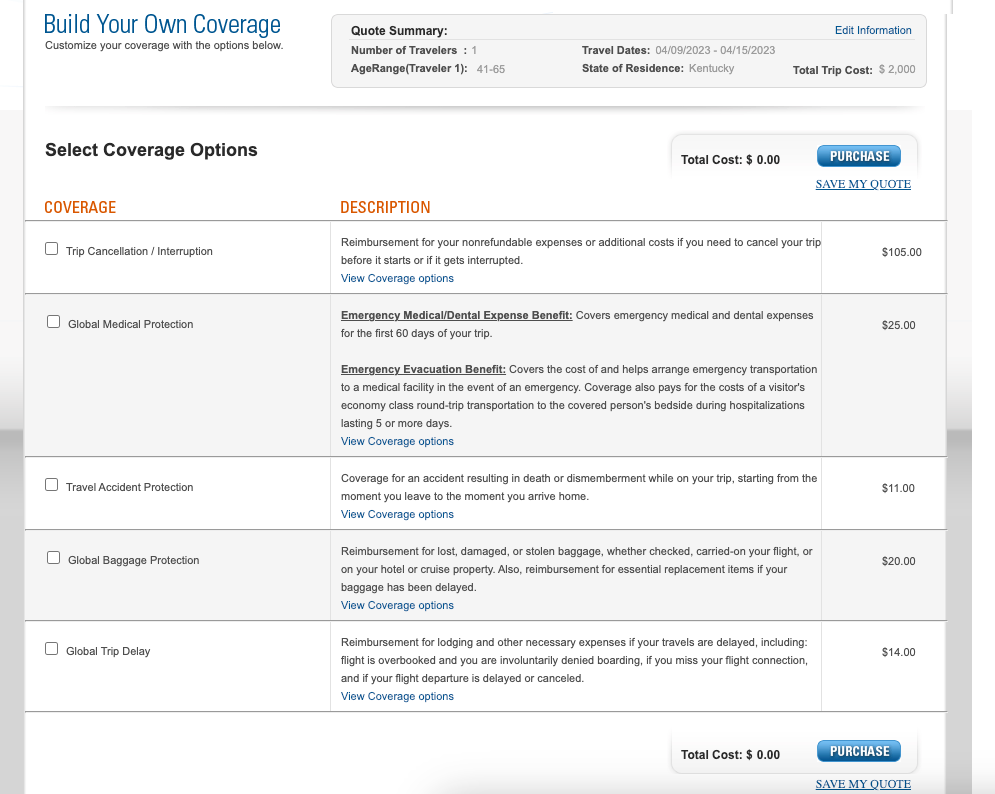
The prices for the packages and the build-your-own plan don't increase for longer trips — as long as the trip cost remains constant. However, the emergency medical and dental benefit is only available for your first 60 days of travel.
Typically, Amex won't cover any loss you incur because of a preexisting medical condition that existed within 90 days of the coverage effective date. However, Amex may waive its preexisting-condition exclusion if you meet both of the following requirements:
- You must be medically able to travel at the time you pay the policy premium.
- You pay the policy premium within 14 days of making the first covered trip deposit.
- Amex's build-your-own coverage option allows you to only purchase — and pay for — the coverage you need.
- Coverage on long trips doesn't cost more than coverage for short trips, making this policy ideal for extended getaways. However, the emergency medical and dental benefit only covers your first 60 days of travel.
- American Express Travel Insurance can protect travel expenses you purchase with Amex Membership Rewards points in the Pay with Points program (as well as travel expenses bought with cash, debit or credit). However, travel expenses bought with other types of points and miles aren't covered.
Purchase your policy here: American Express Travel Insurance .
GeoBlue is different from most other providers described in this piece because it only provides medical coverage while you're traveling internationally and does not offer benefits to protect the cost of your trip. There are many different policies. Some require you to have primary health insurance in the U.S. (although it doesn't need to be provided by Blue Cross Blue Shield), but all of them only offer coverage while traveling outside the U.S.
Two single-trip plans are available if you're traveling for six months or less. The Voyager Choice policy provides coverage (including medical services and medical evacuation for a sudden recurrence of a preexisting condition) for trips outside the U.S. to travelers who are 95 or younger and already have a U.S. health insurance policy.
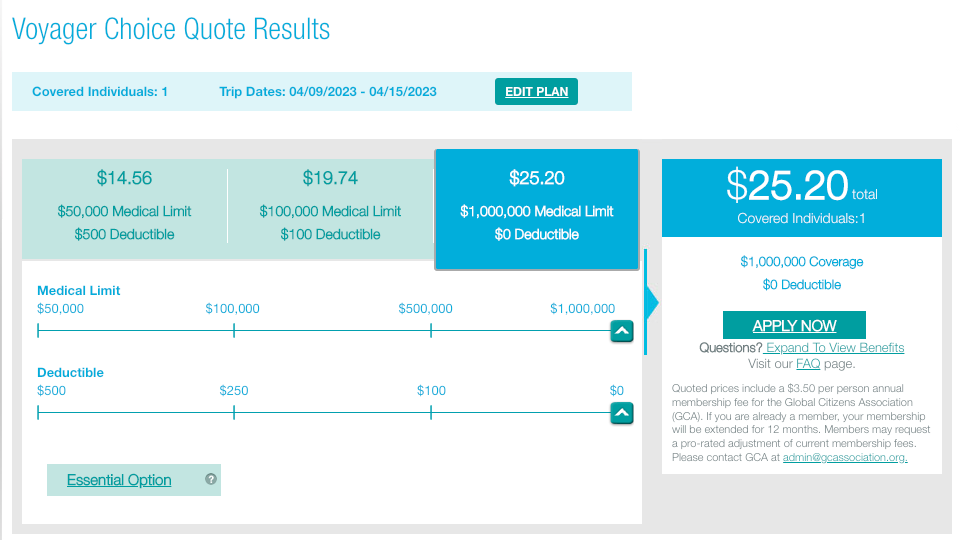
The Voyager Essential policy provides coverage (including medical evacuation for a sudden recurrence of a preexisting condition) for trips outside the U.S. to travelers who are 95 or younger, regardless of whether they have primary health insurance.
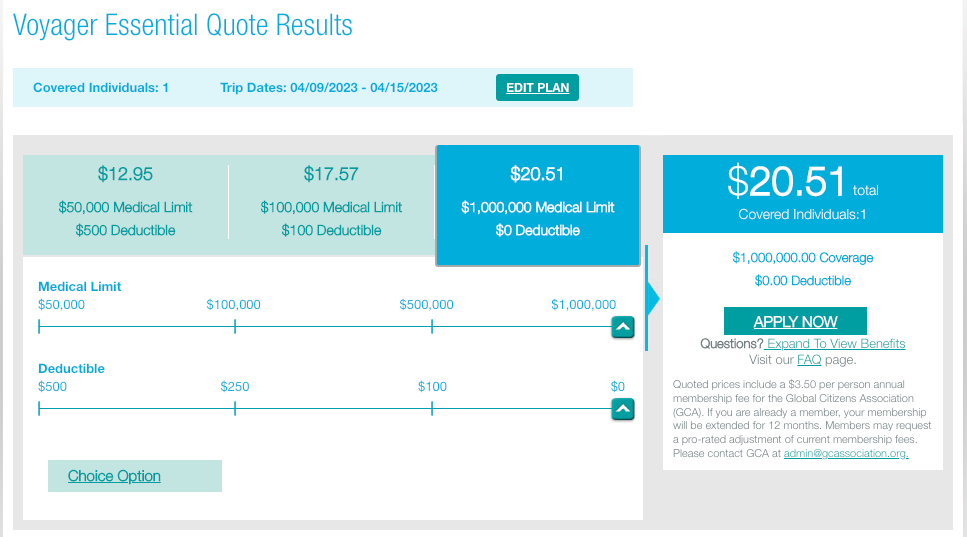
In addition to these options, two multi-trip plans cover trips of up to 70 days each for one year. Both policies provide coverage (including medical services and medical evacuation for preexisting conditions) to travelers with primary health insurance.
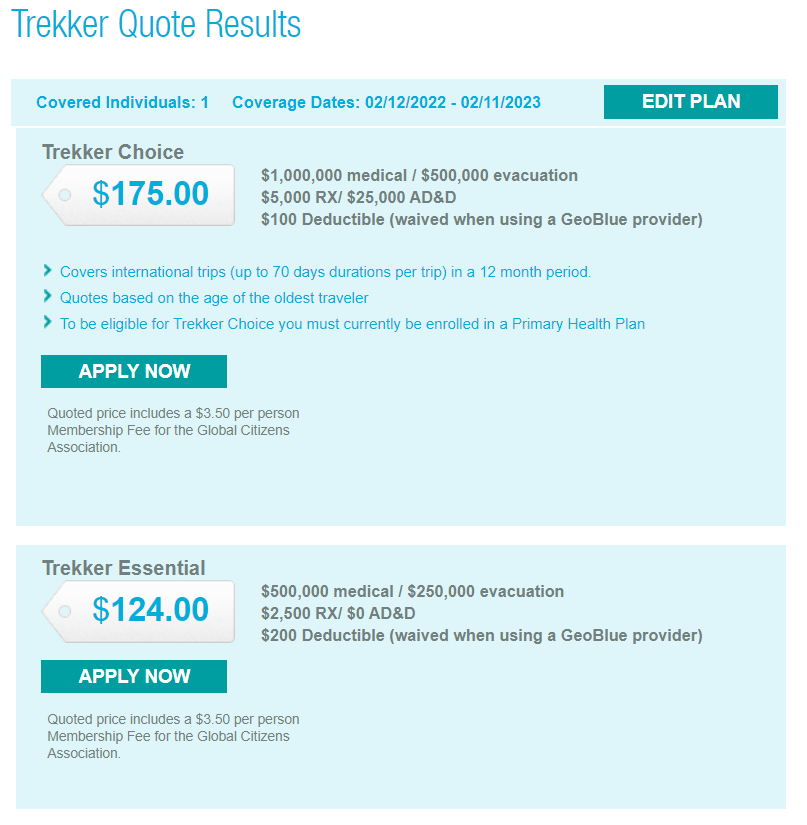
Be sure to check out GeoBlue's COVID-19 notices before buying a plan.
Most GeoBlue policies explicitly cover sudden recurrences of preexisting conditions for medical services and medical evacuation.
- GeoBlue can be an excellent option if you're mainly concerned about the medical side of travel insurance.
- GeoBlue provides single-trip, multi-trip and long-term medical travel insurance policies for many different types of travel.
Purchase your policy here: GeoBlue .
IMG offers various travel medical insurance policies for travelers, as well as comprehensive travel insurance policies. For a single trip of 90 days or less, there are five policy types available for vacation or holiday travelers. Although you must enter your gender, males and females received the same quote for my one-week search.
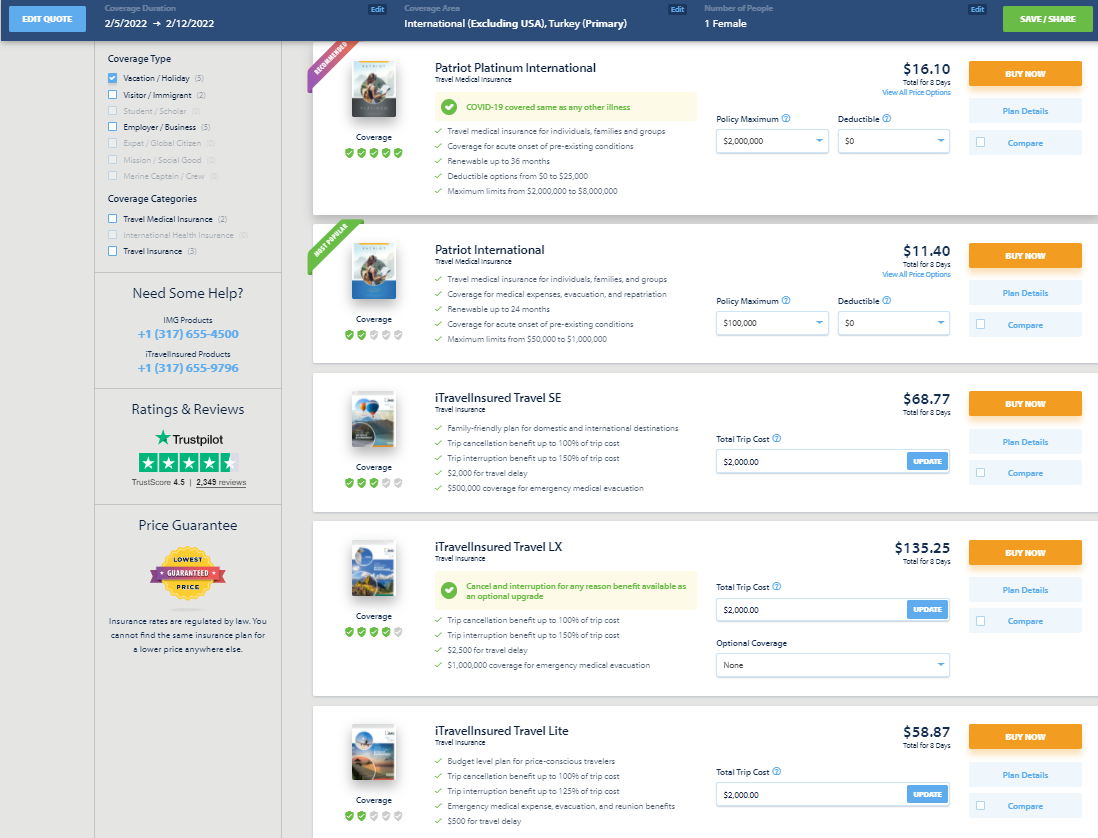
You can purchase an annual multi-trip travel medical insurance plan. Some only cover trips lasting up to 30 or 45 days, but others provide coverage for longer trips.
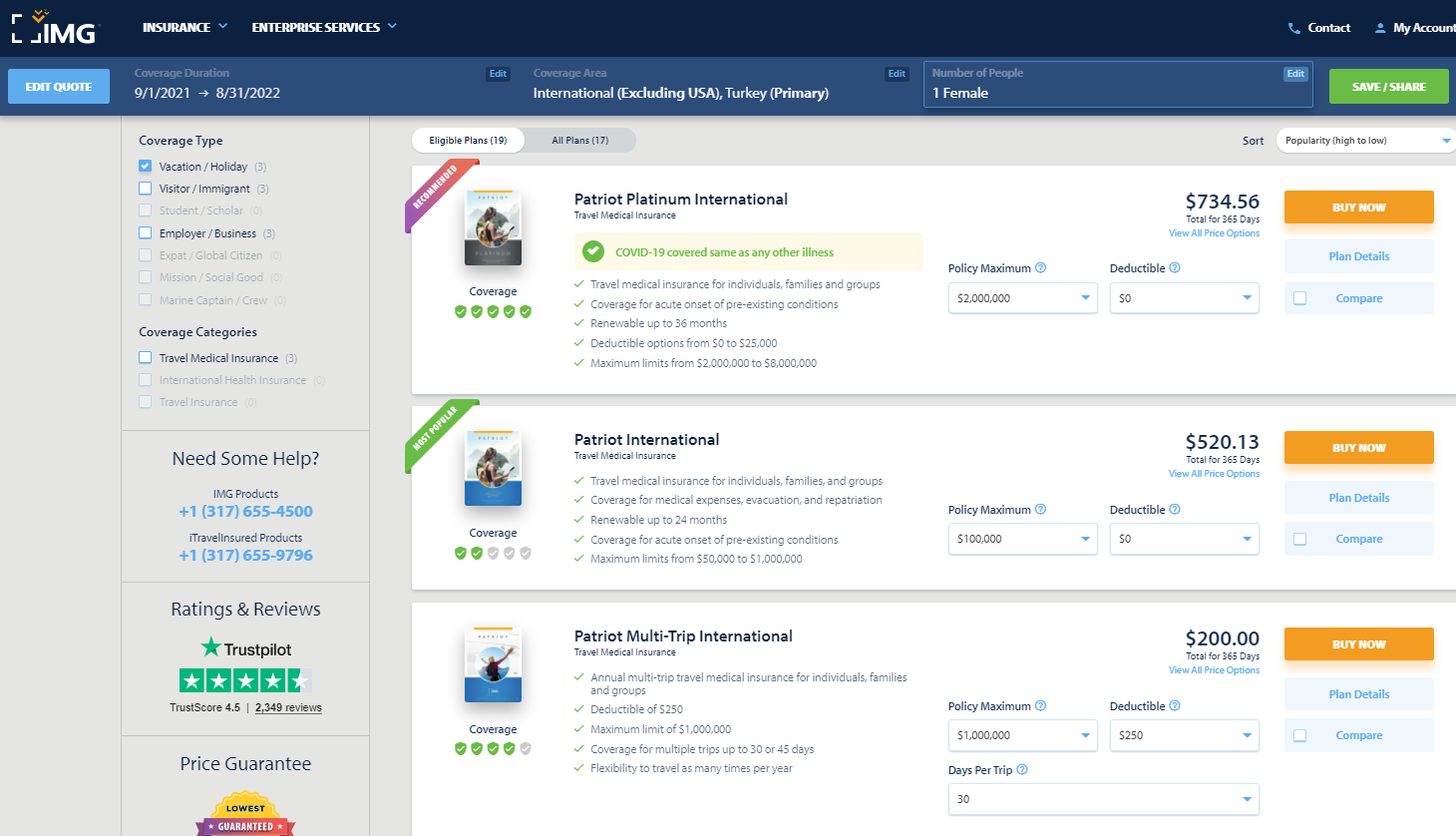
See IMG's page on COVID-19 for additional policy information as it relates to coronavirus-related claims.
Most plans may cover preexisting conditions under set parameters or up to specific amounts. For example, the iTravelInsured Travel LX travel insurance plan shown above may cover preexisting conditions if you purchase the insurance within 24 hours of making the final payment for your trip.
For the travel medical insurance plans shown above, preexisting conditions are covered for travelers younger than 70. However, coverage is capped based on your age and whether you have a primary health insurance policy.
- Some annual multi-trip plans are modestly priced.
- iTravelInsured Travel LX may offer optional cancel for any reason and interruption for any reason coverage, if eligible.
Purchase your policy here: IMG .
Travelex Insurance
Travelex offers three single-trip plans: Travel Basic, Travel Select and Travel America. However, only the Travel Basic and Travel Select plans would be applicable for my trip to Turkey.
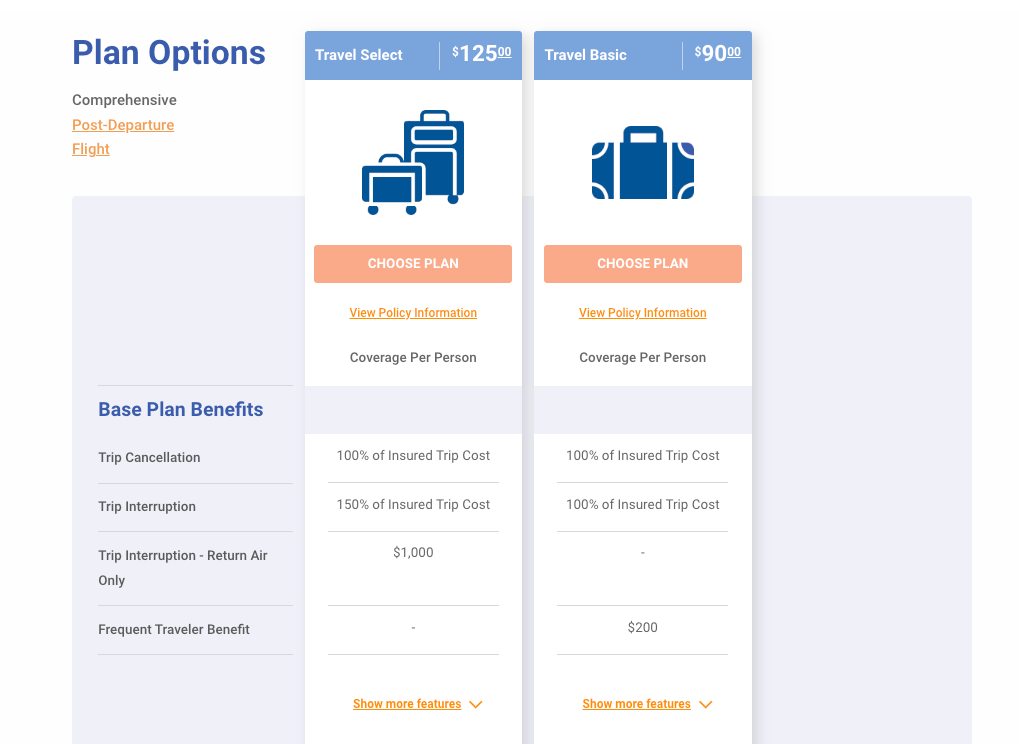
See Travelex's COVID-19 coverage statement for coronavirus-specific information.
Typically, Travelex won't cover losses incurred because of a preexisting medical condition that existed within 60 days of the coverage effective date. However, the Travel Select plan may offer a preexisting condition exclusion waiver. To be eligible for this waiver, the insured traveler must meet all the following conditions:
- You purchase the plan within 15 days of the initial trip payment.
- The amount of coverage purchased equals all prepaid, nonrefundable payments or deposits applicable to the trip at the time of purchase. Additionally, you must insure the costs of any subsequent arrangements added to the same trip within 15 days of payment or deposit.
- All insured individuals are medically able to travel when they pay the plan cost.
- The trip cost does not exceed the maximum trip cost limit under trip cancellation as shown in the schedule per person (only applicable to trip cancellation, interruption and delay).
- Travelex's Travel Select policy can cover trips lasting up to 364 days, which is longer than many single-trip policies.
- Neither Travelex policy requires receipts for trip and baggage delay expenses less than $25.
- For emergency evacuation coverage, you or someone on your behalf must contact Travelex and have Travelex make all transportation arrangements in advance. However, both Travelex policies provide an option if you cannot contact Travelex: Travelex will pay up to what it would have paid if it had made the arrangements.
Purchase your policy here: Travelex Insurance .
Seven Corners
Seven Corners offers a wide variety of policies. Here are the policies that are most applicable to travelers on a single international trip.
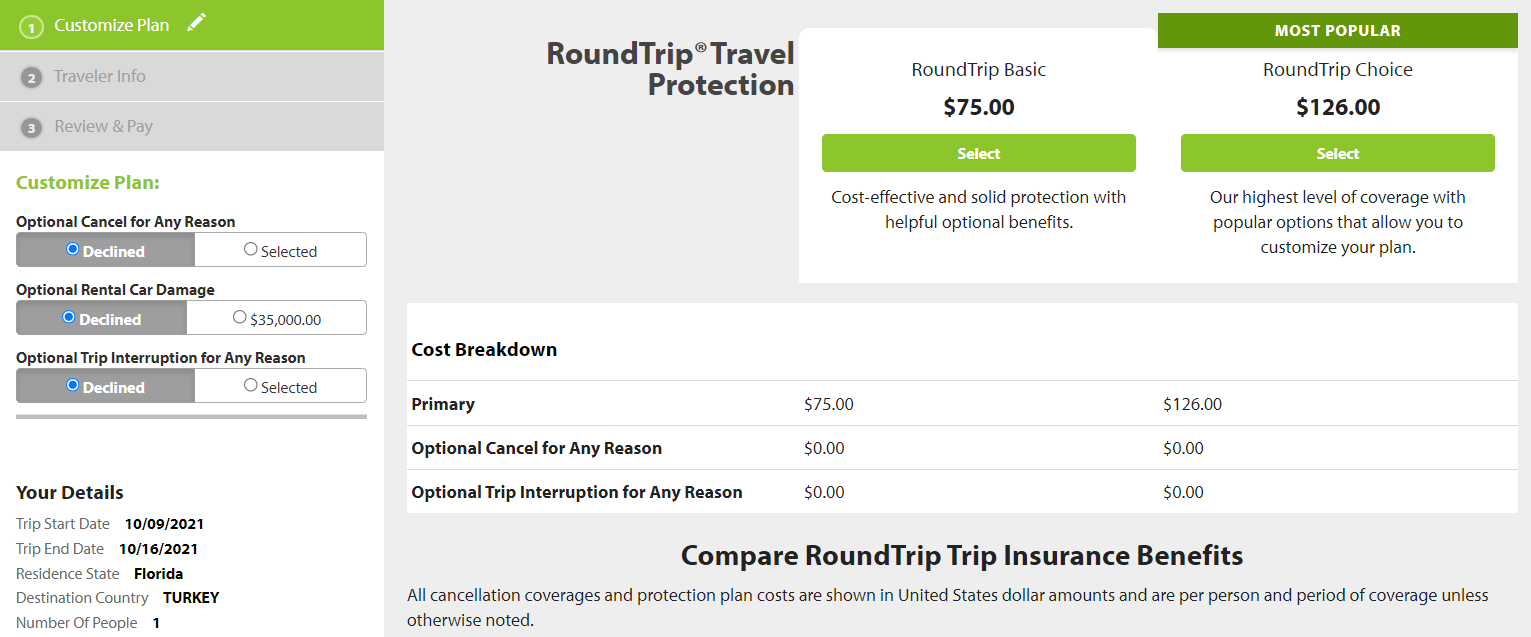
Seven Corners also offers many other types of travel insurance, including an annual multi-trip plan. You can choose coverage for trips of up to 30, 45 or 60 days when purchasing an annual multi-trip plan.
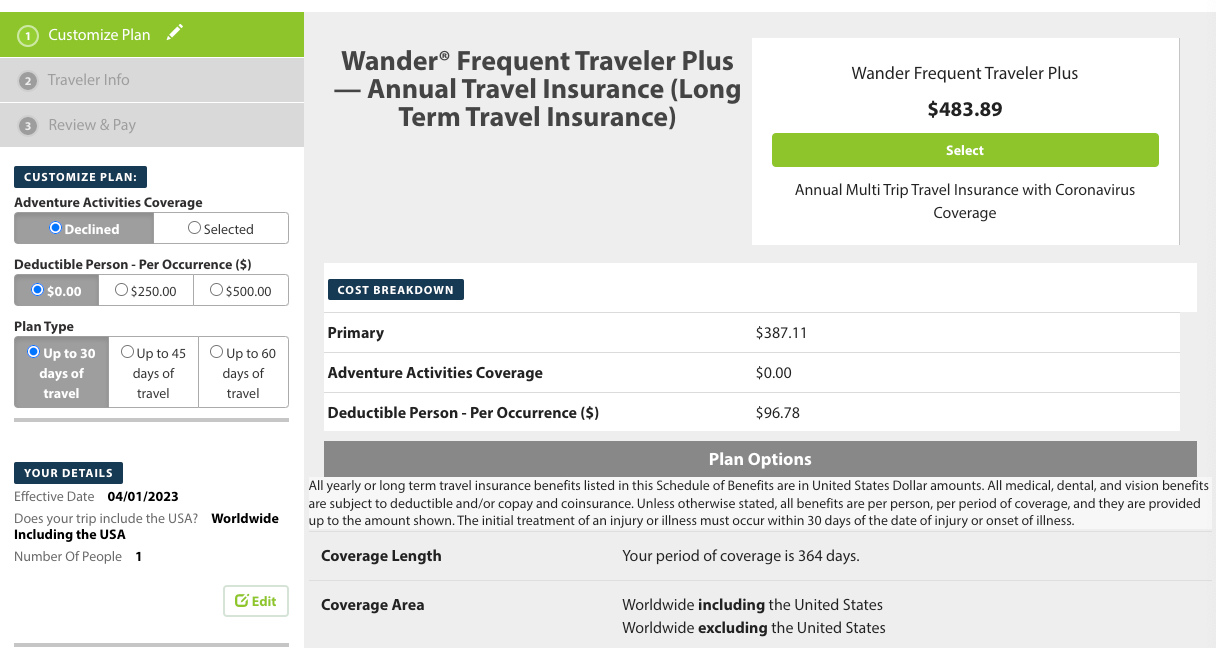
See Seven Corner's page on COVID-19 for additional policy information as it relates to coronavirus-related claims.
Typically, Seven Corners won't cover losses incurred because of a preexisting medical condition. However, the RoundTrip Choice plan offers a preexisting condition exclusion waiver. To be eligible for this waiver, you must meet all of the following conditions:
- You buy this plan within 20 days of making your initial trip payment or deposit.
- You or your travel companion are medically able and not disabled from travel when you pay for this plan or upgrade your plan.
- You update the coverage to include the additional cost of subsequent travel arrangements within 15 days of paying your travel supplier for them.
- Seven Corners offers the ability to purchase optional sports and golf equipment coverage. If purchased, this extra insurance will reimburse you for the cost of renting sports or golf equipment if yours is lost, stolen, damaged or delayed by a common carrier for six or more hours. However, Seven Corners must authorize the expenses in advance.
- You can add cancel for any reason coverage or trip interruption for any reason coverage to RoundTrip plans. Although some other providers offer cancel for any reason coverage, trip interruption for any reason coverage is less common.
- Seven Corners' RoundTrip Choice policy offers a political or security evacuation benefit that will transport you to the nearest safe place or your residence under specific conditions. You can also add optional event ticket registration fee protection to the RoundTrip Choice policy.
Purchase your policy here: Seven Corners .
World Nomads
World Nomads is popular with younger, active travelers because of its flexibility and adventure-activities coverage on the Explorer plan. Unlike many policies offered by other providers, you don't need to estimate prepaid costs when purchasing the insurance to have access to trip interruption and cancellation insurance.
World Nomads offers two single-trip plans.
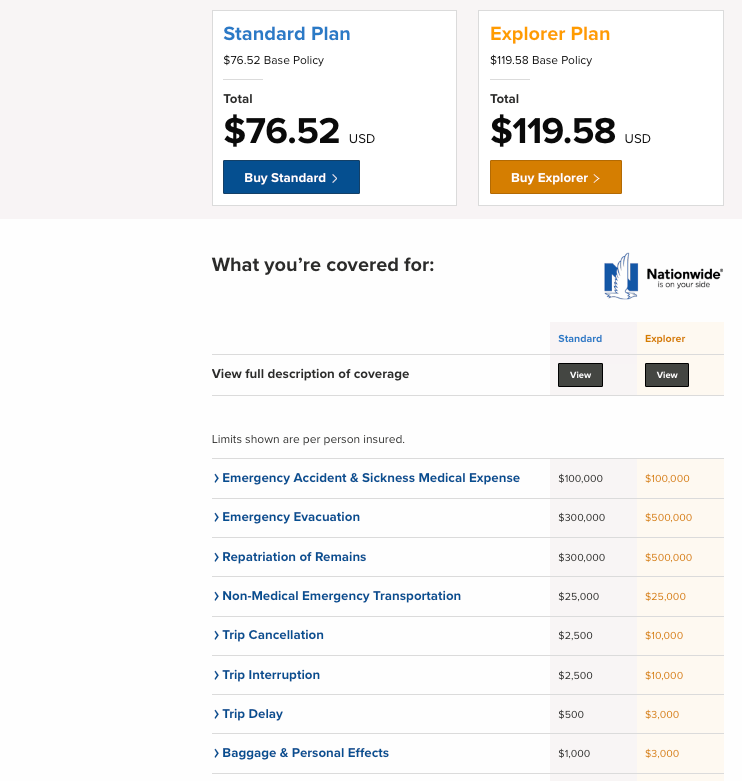
World Nomads has a page dedicated to coronavirus coverage , so be sure to view it before buying a policy.
World Nomads won't cover losses incurred because of a preexisting medical condition (except emergency evacuation and repatriation of remains) that existed within 90 days of the coverage effective date. Unlike many other providers, World Nomads doesn't offer a waiver.
- World Nomads' policies cover more adventure sports than most providers, so activities such as bungee jumping are included. The Explorer policy covers almost any adventure sport, including skydiving, stunt flying and caving. So, if you partake in adventure sports while traveling, the Explorer policy may be a good fit.
- World Nomads' policies provide nonmedical evacuation coverage for transportation expenses if there is civil or political unrest in the country you are visiting. The coverage may also transport you home if there is an eligible natural disaster or a government expels you.
Purchase your policy here: World Nomads .
Other options for buying travel insurance

This guide details the policies of eight providers with the information available at the time of publication. There are many options when it comes to travel insurance, though. To compare different policies quickly, you can use a travel insurance aggregator like InsureMyTrip to search. Just note that these search engines won't show every policy and every provider, and you should still research the provided policies to ensure the coverage fits your trip and needs.
You can also purchase a plan through various membership associations, such as USAA, AAA or Costco. Typically, these organizations partner with a specific provider, so if you are a member of any of these associations, you may want to compare the policies offered through the organization with other policies to get the best coverage for your trip.
Related: Should you get travel insurance if you have credit card protection?
Is travel insurance worth getting?
Whether you should purchase travel insurance is a personal decision. Suppose you use a credit card that provides travel insurance for most of your expenses and have medical insurance that provides adequate coverage abroad. In that case, you may be covered enough on most trips to forgo purchasing travel insurance.
However, suppose your medical insurance won't cover you at your destination and you can't comfortably cover a sizable medical evacuation bill or last-minute flight home . In that case, you should consider purchasing travel insurance. If you travel frequently, buying an annual multi-trip policy may be worth it.
What is the best COVID-19 travel insurance?

There are various aspects to keep in mind in the age of COVID-19. Consider booking travel plans that are fully refundable or have modest change or cancellation fees so you don't need to worry about whether your policy will cover trip cancellation. This is important since many standard comprehensive insurance policies won't reimburse your insured expenses in the event of cancellation if it's related to the fear of traveling due to COVID-19.
However, if you book a nonrefundable trip and want to maintain the ability to get reimbursed (up to 75% of your insured costs) if you choose to cancel, you should consider buying a comprehensive travel insurance policy and then adding optional cancel for any reason protection. Just note that this benefit is time-sensitive and has eligibility requirements, so not all travelers will qualify.
Providers will often require CFAR purchasers insure the entire dollar amount of their travels to receive the coverage. Also, many CFAR policies mandate that you must cancel your plans and notify all travel suppliers at least 48 hours before your scheduled departure.
Likewise, if your primary health insurance won't cover you while on your trip, it's essential to consider whether medical expenses related to COVID-19 treatment are covered. You may also want to consider a MedJet medical transport membership if your trip is to a covered destination for coronavirus-related evacuation.
Ultimately, the best pandemic travel insurance policy will depend on your trip details, travel concerns and your willingness to self-insure. Just be sure to thoroughly read and understand any terms or exclusions before purchasing.
What are the different types of travel insurance?

Whether you purchase a comprehensive travel insurance policy or rely on the protections offered by select credit cards, you may have access to the following types of coverage:
- Baggage delay protection may reimburse for essential items and clothing when a common carrier (such as an airline) fails to deliver your checked bag within a set time of your arrival at a destination. Typically, you may be reimbursed up to a particular amount per incident or per day.
- Lost/damaged baggage protection may provide reimbursement to replace lost or damaged luggage and items inside that luggage. However, valuables and electronics usually have a relatively low maximum benefit.
- Trip delay reimbursement may provide reimbursement for necessary items, food, lodging and sometimes transportation when you're delayed for a substantial time while traveling on a common carrier such as an airline. This insurance may be beneficial if weather issues (or other covered reasons for which the airline usually won't provide compensation) delay you.
- Trip cancellation and interruption protection may provide reimbursement if you need to cancel or interrupt your trip for a covered reason, such as a death in your family or jury duty.
- Medical evacuation insurance can arrange and pay for medical evacuation if deemed necessary by the insurance provider and a medical professional. This coverage can be particularly valuable if you're traveling to a region with subpar medical facilities.
- Travel accident insurance may provide a payment to you or your beneficiary in the case of your death or dismemberment.
- Emergency medical insurance may provide payment or reimburse you if you must seek medical care while traveling. Some plans only cover emergency medical care, but some also cover other types of medical care. You may need to pay a deductible or copay.
- Rental car coverage may provide a collision damage waiver when renting a car. This waiver may reimburse for collision damage or theft up to a set amount. Some policies also cover loss-of-use charges assessed by the rental company and towing charges to take the vehicle to the nearest qualified repair facility. You generally need to decline the rental company's collision damage waiver or similar provision to be covered.
Should I buy travel health insurance?

If you purchase travel with credit cards that provide various trip protections, you may not see much need for additional travel insurance. However, you may still wonder whether you should buy travel medical insurance.
If your primary health insurance covers you on your trip, you may not need travel health insurance. Your domestic policy may not cover you outside the U.S., though, so it's worth calling the number on your health insurance card if you have coverage questions. If your primary health insurance wouldn't cover you, it's likely worth purchasing travel medical insurance. After all, as you can see above, travel medical insurance is often very modestly priced.
How much does travel insurance cost?
Travel insurance costs depend on various factors, including the provider, the type of coverage, your trip cost, your destination, your age, your residency and how many travelers you want to insure. That said, a standard travel insurance plan will generally set you back somewhere between 4% and 10% of your total trip cost. However, this can get lower for more basic protections or become even higher if you include add-ons like cancel for any reason protection.
The best way to determine how much travel insurance will cost is to price out your trip with a few providers discussed in the guide. Or, visit an insurance aggregator like InsureMyTrip to quickly compare options across multiple providers.
When and how to get travel insurance

For the most robust selection of available travel insurance benefits — including time-sensitive add-ons like CFAR protection and waivers of preexisting conditions for eligible travelers — you should ideally purchase travel insurance on the same day you make your first payment toward your trip.
However, many plans may still offer a preexisting conditions waiver for those who qualify if you buy your travel insurance within 14 to 21 days of your first trip expense or deposit (this time frame may vary by provider). If you don't need a preexisting conditions waiver or aren't interested in CFAR coverage, you can purchase travel insurance once your departure date nears.
You must purchase coverage before it's needed. Some travel medical plans are available for purchase after you have departed, but comprehensive plans that include medical coverage must be purchased before departing.
Additionally, you can't buy any medical coverage once you require medical attention. The same applies to all travel insurance coverage. Once you recognize the need, it's too late to protect your trip.
Once you've shopped around and decided upon the best travel insurance plan for your trip, you should be able to complete your purchase online. You'll usually be able to download your insurance card and the complete policy shortly after the transaction is complete.
Related: 7 times your credit card's travel insurance might not cover you
Bottom line
Not all travel insurance policies and providers are equal. Before buying a plan, read and understand the policy documents. By doing so, you can choose a plan that's appropriate for you and your trip — including the features that matter most to you.
For example, if you plan to go skiing or rock climbing, make sure the policy you buy doesn't contain exclusions for these activities. Likewise, if you're making two back-to-back trips during which you'll be returning home for a short time in between, be sure the plan doesn't terminate coverage at the end of your first trip.
If you're looking to cover a sudden recurrence of a preexisting condition, select a policy with a preexisting condition waiver and fulfill the requirements for the waiver. After all, buying insurance won't help if your policy doesn't cover your losses.
Disclaimer : This information is provided by IMT Services, LLC ( InsureMyTrip.com ), a licensed insurance producer (NPN: 5119217) and a member of the Tokio Marine HCC group of companies. IMT's services are only available in states where it is licensed to do business and the products provided through InsureMyTrip.com may not be available in all states. All insurance products are governed by the terms in the applicable insurance policy, and all related decisions (such as approval for coverage, premiums, commissions and fees) and policy obligations are the sole responsibility of the underwriting insurer. The information on this site does not create or modify any insurance policy terms in any way. For more information, please visit www.insuremytrip.com .
- Search Search Please fill out this field.
What Is Travel Insurance?
Understanding travel insurance, how travel insurance works, comprehensive travel insurance.
- Trip Cancellation or Interruption
Damage and Baggage Losses Coverage
Rental insurance, travel health insurance.
- AD&D Coverage
Other Travel Insurance Coverage
How to get travel insurance, the bottom line.
- Personal Finance
What Is Travel Insurance, and What Does It Cover?
Julia Kagan is a financial/consumer journalist and former senior editor, personal finance, of Investopedia.
:max_bytes(150000):strip_icc():format(webp)/Julia_Kagan_BW_web_ready-4-4e918378cc90496d84ee23642957234b.jpg)
Jackyenjoyphotography / Getty Images
Travel insurance is a type of insurance covering financial losses associated with traveling, and it can be useful protection for domestic or international travel. Whether you missed your flight to Florida, lost your bags in Berlin, or broke your ankle in Ankara, the best travel insurance companies can help remedy all kinds of travel mishap costs.
Key Takeaways
- Travel insurance can be purchased online, from your tour operator, or from other sources.
- The main categories of travel insurance include trip cancellation or interruption coverage, baggage and personal effects coverage, rental property and rental car coverage, medical coverage, and accidental death coverage.
- Coverage often includes 24/7 emergency services, such as replacing lost passports, cash wire assistance, and rebooking canceled flights.
- It's important to understand what's covered and what's not, and any limitations on coverage amounts and coverage requirements.
Travel insurance helps cover financial losses associated with surprise circumstances that could ruin a trip, including illness, injury, accidents, flight or other transportation delays, and other issues. This insurance costs 4% to 10% of a trip's price. So, for a $10,000 trip, trip insurance could cost between $400 and $1,000.
Premiums—or the price you pay for coverage—are based on the coverage type, your age, destination, trip cost, and more. Specialized policy riders focus on the needs of business travelers, athletes, and expatriates .
You may already have travel insurance coverage from your homeowners or renters insurance or your credit cards. Call your insurance agent to find out about your current travel coverage, and your credit card company to find out about any benefits you get when you purchase air or train tickets, rent a car, or book a hotel using the card. Many travel rewards cards come with built-in travel insurance and other travel benefits.
Travel insurance may be sold online by travel agents, travel suppliers (airlines, cruise lines), private insurance companies, or insurance brokers when booking your flight, accommodations, or car. Travel insurance companies include AIG Travel, Berkshire Hathaway Travel Protection, Generali Global Assistance, GeoBlue, Nationwide, and more.
Typically, you'll purchase coverage shortly after initial bookings for lodging, flights, or other transportation, activities, and rental cars. Some policies may require you to do so to retain full coverage. Here are some terms to know for travel insurance.
Primary and Secondary Coverage
If you buy travel insurance, you may have concurrent insurance coverage , meaning you're covered under more than one policy. When the travel coverage is primary, the travel insurance reimburses you first without needing to make a claim through another company—and sparing you potentially increased policy rates.
If the travel insurance coverage is secondary, you'll first need to attempt to file a claim with other coverage, such as an airline (lost baggage) or your own auto insurance (damaged car).
Coverage Requirements
There are usually stipulations spelled out on how you qualify for coverage. Your claim must fall under the types of coverage offered. For example, lost baggage insurance might include coverage for personal items, prescriptions, credit cards, and your passport or visa. You may also need to take extra steps to qualify for coverage, such as reporting the loss or theft to the police.
Policy Coverage Limits
This is the maximum amount you can receive for the claim. For example, you might only receive $500 per bag. You may not even receive more for expensive items such as jewelry or electronic devices. You might need to provide receipts for items over a certain amount. Without receipts, the insurer may only pay for repairs.
Some coverage might require you to pay a deductible, or flat amount, before covering the remainder of your claim up to the limit.
These are the conditions under which your coverage will not cover the loss. Each policy differs. For example, your baggage damage coverage may not cover losses caused by animals. It may exclude coverage of bicycles, hearing aids or other medical devices, keys, and tickets, or seizure by a government or customs official.
Pre-existing conditions may not be covered by travel medical insurance, or may only be covered if you buy a travel insurance plan within one to two weeks of booking your trip.
Comprehensive travel insurance includes many types of coverage listed below, bundled into one plan. Most commonly, comprehensive travel insurance bundles a 24-hour assistance line to help find doctors or get assistance in an emergency, reimburse you for trip cancellation , interruption and delay, baggage loss or delay, and medical expense and medical evacuation coverage.
Alternatively, you can purchase each coverage type separately. This may be wise if you already have coverage through other insurance or can cover your losses in many cases.
Trip Cancellation or Interruption Coverage
This insurance reimburses a traveler for some or all prepaid, nonrefundable travel expenses, and comes in the following forms:
- Trip cancellation : Reimburses you for paid travel expenses if you can't travel for a preapproved reason.
- Travel delay : Reimburses you for expenses if you can't travel because of a delay.
- Trip interruption : Reimburses you for travel costs if your trip is cut short.
- Cancel for any reason (CFAR) : Reimburses you for a portion of costs if you cancel the trip for any reason; typically more expensive than the other types listed above.
With most of the above, acceptable cancellation and interruption causes and reimbursement amounts vary by provider. Acceptable reasons for a claim might include the following:
- Your illness
- Illness or death in your immediate family
- Sudden business conflicts
- Weather-related issues
- Legal obligations such as jury duty
You may need to pay more or meet more requirements to file a claim for a cancellation due to financial default, terrorism in your destination city, or work reasons.
When traveling, register your travel plans with the State Department through its free travel registration website , the Smart Traveler Enrollment Program (STEP). The nearest embassy or consulate can contact you if there is a family, state, or national emergency.
Baggage and personal belongings being lost, stolen, or damaged is a frequent travel problem—and can quickly ruin a trip as you must shop for replacements. Baggage and personal effects coverage protects lost, stolen, or damaged belongings during travel to, in, and from a destination.
However, many travel insurance policies pay for belongings only after you exhaust all other available claims. Baggage coverage may have many restrictions and exclusions, such as only covering up to $500 per item and $250 for each additional item. You may be able to increase or decrease amounts, shop around for coverage, or increase limits by paying more.
For example, the insurance may not pay for lost and damaged luggage due to airline fault. Most carriers, such as airlines, reimburse travelers if baggage is lost or destroyed due to the airline's error. However, there may be limitations on reimbursement amounts, so baggage and personal effects coverage provide an additional layer of protection.
Vacation rental insurance covers costs from accidental damage to a vacation rental property. Some plans also offer trip cancellation and interruption to help reimburse costs when you can't use your vacation rental. Some of these reasons could include the following:
- Lost or stolen keys
- Unsanitary or unsafe vacation property
- Vacation rental wasn't as advertised
- The company oversold your vacation rental
Rental car insurance covers a rental car's damage or loss while on a trip, taking the place of the rental agency's collision damage waiver (CDW) or your regular car insurance policy. Policies vary and may cover collisions, theft, vandalism, and other incidents. Rental car insurance may be a secondary policy to your own car insurance. However, it doesn't cover your liability or legal responsibility for damage or injury you cause to others.
Medical coverage can help with unexpected international medical and dental expenses, and help with locating doctors and healthcare facilities abroad. As with other policies, coverage will vary by price and provider.
- Foreign travel medical coverage : These policies range from five days to one year or longer, and cover costs arising from illness and injuries while traveling.
- Medical evacuation: May cover airlift travel to a medical facility and medical evacuation to receive care.
Consult with your current medical insurers before purchasing a policy to determine whether a policy extends its coverage outside the country. Most health insurance companies pay “customary and reasonable” hospital costs if you become sick or injured while traveling, but few will pay for a medical evacuation.
The U.S. government doesn't insure citizens or pay for medical expenses abroad . Before purchasing a policy, read the provisions to see what exclusions, such as preexisting medical conditions, apply. Don't assume that the new coverage mirrors that of your existing plan. Routine medical care is typically excluded unless you buy a long-term medical plan intended for expatriates, missionaries, maritime crew members, or others abroad for extended periods.
Medicare or Medicaid generally don't cover medical costs overseas unless you have specific Medicare Advantage or Medigap plans covering emergency overseas care.
Accidental Death and Dismembership (AD&D) Coverage
If an accident results in death or serious injury, an AD&D policy pays a lump sum to surviving beneficiaries or you for an injury. The insurance usually offers three parts, providing coverage for accidents and fatalities:
- Flight accident insurance: Occurring during flights on a licensed commercial airliner.
- Common carrier: Resulting from public transportation such as train, ferry, or bus travel.
- General travel: Occurring at any point during a trip.
Exclusions that may apply include death caused by drug overdose or sickness. In addition, only some injuries may be covered, specifically hand, foot, limb, or eyesight. There are stated amount limits per injury.
Accidental death coverage may not be necessary if you already have a life insurance policy. However, benefits paid by your travel insurance coverage may be in addition to those paid by your life insurance policy, leaving more money to your beneficiaries.
Depending on your plan or package selected, you may be able to add the following travel insurance types:
- Identity theft resolution services
- School activity coverage
- Destination wedding coverage
- Adventure sports coverage
- Pet health as a reason for cancellation or delay
- Hunting or fishing activities as a reason for cancellation or delay
- Missed flight connections
Travel insurance varies in cost, exclusions, and coverage. Coverage is available for single, multiple, and yearly trips. To get travel insurance, you fill out an insurance company's application about your trip, including the following:
- Travelers going
- Destination
- Travel dates
- Date of first payment toward your trip
The insurance company reviews the information using underwriting guidelines to guide issuing a policy and the rate. If it accepts your application, the company will issue a policy covering your trip. If the company rejects your application, you can apply with another insurer.
When you receive your policy, you'll typically get a 10- to 15-day review period to review the contract's fine details. If you don't like the policy, you can return it for a refund. Read through the document and ensure the plan you purchased doesn't apply too many loopholes, and that it covers:
- Emergency medical care and transport back to the U.S.
- High enough limits to cover your costs or damages
- Regions you're traveling to
- Your trip duration or number of trips
- All activities you plan to enjoy
- Preexisting conditions and people of your age
Also, read through for any exclusions. For example, types of property covered, and whether property lost or damaged by the airline is covered, and how.
Do I Need Travel Insurance?
You might consider travel insurance if you can't afford to cancel and then rebook an expensive or long trip. You might also consider travel health insurance if your health insurance doesn't cover international costs. An alternative is to book an easily cancellable vacation—look for a pay-later hotel room and car rental options, flexible cancellation terms, and the ability to rebook without a fee.
What Is Not Covered by Travel Insurance?
Review the travel insurance policy to discover exclusions. According to NAIC, common travel policy exclusions are:
- A traveler's pre-existing health conditions
- Civil and political unrest at the traveler's destination
- Pregnancy and childbirth
- Coverage for those engaging in adventure or dangerous activities.
Pandemics may also be excluded from coverage.
How Can I Get Cheap Travel Insurance?
Your homeowners or renters insurance may provide some protection for personal belongings, and airlines and cruise lines are responsible for loss and damage to your baggage during transport. Also, credit cards may provide automatic protection for things like delays and luggage or rental car accidents if used for deposits or other trip-related expenses.
The main types of travel insurance include trip cancellation or interruption coverage, baggage and personal effects coverage, medical expense coverage, and accidental death or flight accident coverage. Before buying a policy, check to see if you already have coverage through your own health or car insurance or a credit card.
Mass.gov. " Travel Insurance. "
Minnesota Department of Commerce. " Travel Insurance ."
U.S. Travel Insurance Association. " Frequently Asked Questions ."
Texas Department of Insurance. " Should You Get Travel Insurance? "
National Association of Insurance Commissioners. “ Taking a Trip? Information about Travel Insurance You Should Know Before You Hit the Road .”
U.S. Department of State. “ Your Health Abroad. ”
Medicare.gov. " Medicare Coverage Outside the United States ." Page 4.
Medicare.gov. " Medigap & Travel. "
NAIC. " Travel Insurance ."
:max_bytes(150000):strip_icc():format(webp)/Primary-Image-how-much-does-travel-insurance-cost-7377124-c44e95776d284d3e84b756908efb5add.jpg)
- Terms of Service
- Editorial Policy
- Privacy Policy
- Your Privacy Choices
Sleepover at Polly Pocket's? How to stay in the iconic '90's compact-themed Airbnb

Spending the night in Polly Pocket's bright and colorful world has never been easier.
To celebrate Polly Pocket's 35th birthday, the Mattel -owned toy has created an Airbnb in the iconic '90s Polly Pocket compact style. The two-story " Slumber Party Fun " compact features a vanity full of hair and nail accessories, a retro fridge, Polly Pocket's closet, a friendship bracelet-making station, and a life-sized Action Park Tent 10 feet away from the compact.
"Try on my most iconic outfits—yes, the ones you used to chew on when you were younger—in my closet," the Airbnb listing reads, a humorous nod to the very chewable rubber clothes that were used to dress Polly Pocket. "They slip on right over your clothes and are extremely chic. No bite marks, please!"
Polly Pocket is the host of the Airbnb , according to the listing.
Meet the 'Dream Besties': Barbie-launched dolls that have goals like owning a tech company
How to book the Polly Pocket Airbnb
The Airbnb is located in Littleton, Massachusetts, and is available for guests to book starting Aug. 21 at 6 a.m. PT (9 a.m. ET) through Aug. 28 at 11:59 p.m. PT (2:59 a.m. ET) for one of three one-night stays happening Sept. 12-14.
The Airbnb can sleep four guests each in the adjacent tent and will cost $89 a person, symbolic of Polly Pocket's 1989 debut.
According to a release, Polly Pocket is also opening the location for 21 daytime experiences for up to 12 guests during from Sept. 16 to Oct. 6. Those can be booked starting Sug. 21 at 6 a.m. PT (9 a.m. ET) through Aug. 28 at 11:59 p.m. PT (2:29 a.m. ET).
Any guests visiting the Airbnb are responsible for their own travel to and from Littleton, which is located about 40 miles west of Boston.
See photos of Polly Pocket's Airbnb
Advertisement
Supported by
Fact-Checking Claims About Tim Walz’s Record
Republicans have leveled inaccurate or misleading attacks on Mr. Walz’s response to protests in the summer of 2020, his positions on immigration and his role in the redesign of Minnesota’s flag.
- Share full article

By Linda Qiu
Since Gov. Tim Walz of Minnesota was announced as the Democratic nominee for vice president, the Trump campaign and its allies have gone on the attack.
Mr. Walz, a former teacher and football coach from Nebraska who served in the National Guard, was elected to the U.S. House of Representatives in 2006 and then as Minnesota’s governor in 2018. His branding of former President Donald J. Trump as “weird” this year caught on among Democrats and helped catapult him into the national spotlight and to the top of Vice President Kamala Harris’s list of potential running mates.
The Republican accusations, which include questions over his military service , seem intended at undercutting a re-energized campaign after President Biden stepped aside and Ms. Harris emerged as his replacement at the top of the ticket. Mr. Trump and his allies have criticized, sometimes inaccurately, Mr. Walz’s handling of protests in his state, his immigration policies, his comments about a ladder factory and the redesign of his state’s flag.
Here’s a fact check of some claims.
What Was Said
“Because if we remember the rioting in the summer of 2020, Tim Walz was the guy who let rioters burn down Minneapolis.” — Senator JD Vance of Ohio, the Republican nominee for vice president, during a rally on Wednesday in Philadelphia
This is exaggerated. Mr. Walz has faced criticism for not quickly activating the National Guard to quell civil unrest in Minneapolis in the summer of 2020 after the murder of George Floyd by a police officer. But claims that he did not respond at all, or that the city burned down, are hyperbolic.
Mr. Floyd was murdered on May 25, 2020, and demonstrators took to the streets the next day . The protests intensified, with some vandalizing vehicles and setting fires. More than 700 state troopers and officers with the Minnesota Department of Natural Resources’ mobile response team were deployed on May 26 to help the city’s police officers, according to a 2022 independent assessment by the state’s Department of Public Safety of the response to the unrest.
But the report noted that issues with communication delayed the deployment of the state National Guard.
The mayor, Jacob Frey, asked Mr. Walz to activate the National Guard the night of May 27. An aide to Mr. Frey texted a colleague around 8 p.m. that Mr. Walz was “hesitating,” documents obtained by the local news media show . The Trump campaign cited these records as evidence of Mr. Walz’s refusal to act.
Mr. Walz has argued that he did not believe Mr. Frey “knew what he was asking for,” and that the mayor did not specify the number of troops, their mission or their abilities.
The city’s police department submitted a written request the night of May 27 for 600 guardsmen. State officials said that the request was not specific enough and that they were waiting for more detail before approving the request, but that city officials were not aware that more detail was needed, according to the 2022 report.
Mr. Frey sent a formal request for troops the morning of May 28, and Mr. Walz activated the National Guard shortly afterward — two days after protests had begun. The Guard tweeted at about 4 p.m. local time that it was ready to respond to the governor’s request.
By that time, one of the city’s police precincts had already been damaged by fire. The Trump campaign also noted that a police officer testified in 2020 that she had heard “thirdhand” that Mr. Walz had said to “give up the precinct”; at the time, a spokesman for Mr. Walz disputed that characterization.
It is also worth noting that Mr. Trump, in a June 2020 phone call with governors, praised Mr. Walz’s response: “Tim Walz. Again, I was very happy with the last couple of days, Tim. You called up big numbers and the big numbers knocked them out so fast.”
“I know him a little bit. I helped him during the riots because his house was surrounded by people that were waving an American flag — doesn’t sound like very bad people. He called me and he was very concerned, very, very concerned that it was going to get out of control. They only had one guard, I guess, it was at the mansion or his house in some form. And he called me. And I said what do you want me to do about it? I was in the White House. He said if you would put out the word that I’m a good person. And I did. I put out the word.” — Mr. Trump in an interview on Fox News on Wednesday
This is misleading. Mr. Trump’s version of events is wrong on several details, and Mr. Walz’s own account noticeably differs.
On April 17, 2020 — more than a month before George Floyd’s murder — hundreds of demonstrators gathered in front of Mr. Walz’s residence to protest a stay-at-home order the governor had imposed because of the coronavirus pandemic.
That morning, Mr. Trump had written on social media, “LIBERATE MINNESOTA!,” along with calls to “liberate” other states under lockdown orders.
That day, Mr. Walz said he had tried unsuccessfully to call Mr. Trump and Vice President Mike Pence to ask “what they think we could have done differently” to respond to the spread of the virus.
Three days later, on April 20, Mr. Trump wrote that he had received a “very nice call” from Mr. Walz and that “good things are happening.”
In a news conference that day, Mr. Walz said that he had a “very good and long conversation” with Mr. Trump on April 18 — after the protesters had left — about the need for more personal protective equipment and testing abilities.
In an interview with Politico in September 2021 published this week, Mr. Walz said that Mr. Trump’s tweet had “brought armed people to my house” and that Mr. Trump had never responded when he asked what “liberate Minnesota” meant.
“Tim Walz went on TV to talk about trying to help illegal aliens climb over the border wall. Tim Walz championed government-issued IDs, driver’s licenses for illegal aliens, which results in countless motorists being killed each and every year. Tim Walz championed free health care for illegal aliens, which will bankrupt America.” — Stephen Miller, a former Trump administration official, in an interview on Fox News on Tuesday
This is exaggerated. Mr. Miller distorted comments Mr. Walz made regarding a border wall. He is correct that Mr. Walz signed legislation allowing unauthorized immigrants to obtain driver’s licenses and giving them publicly subsidized health care coverage through a state program for low-income individuals. But while Mr. Walz championed eligibility expansion, it is unclear whether he supported the health care expansion.
In 2023, Mr. Walz signed legislation expanding driver’s license eligibility to all residents of the state, regardless of immigration status. In a news release , he said he was a “longtime supporter of the bill” and expressed pride at the measure, saying it would make roads safer.
That May, Mr. Walz also signed a budget deal into law that, among other provisions, allowed unauthorized immigrants to enroll in MinnesotaCare , the state’s program for low-income residents. Mr. Walz’s budget had proposed expanding eligibility only to undocumented immigrants under 19, and a local publication reported that he opposed allowing undocumented adults to also have access to the program. His news release at the time did not mention the expansion. Additionally, MinnesotaCare provides subsidized, but not always free insurance. The health care program is funded in part by the state, and the expansion, backed by state money , would not dip into federal coffers and “bankrupt” the country.
Mr. Miller’s comment about Mr. Walz helping immigrants “climb over the border wall” distorts Mr. Walz’s remarks. In an interview last week on CNN , Mr. Walz said that the “United States needs to control its border” but argued that Mr. Trump was “not interested in solving the problem.”
“I always say, let me know how high it is,” he said, wryly expressing the ineffectiveness of a border wall. “If it’s 25 feet, then I’ll invest in the 30-foot ladder factory. That’s not how you stop this.”
He continued, “You stop this using electronics, you stop it using more border control agents, and you stop it by having a legal system that allows for that tradition of allowing folks to come here, just like my relatives did to come here, be able to work and establish the American dream. He’s not interested in that. He wants to demonize.”
“Don’t forget he tried to redesign the Minnesota state flag to look like the Somali national flag. You just can’t get further out there in America.” — Representative Andy Biggs, Republican of Arizona, in an interview on a right-wing streaming platform on Wednesday
False. Minnesota adopted a new flag on May 11, after a monthslong redesign effort and thousands of public submissions. Mr. Walz had little to do with the design, which pays tribute to various facets of the state — not Somalia.
Prompted by criticism that the state’s old flag was offensive to Native Americans and bore too many similarities to other state flags, Minnesota legislators passed a measure in 2023 establishing a commission to redesign the state’s emblems. Mr. Walz signed that legislation into law. The commission received more than 2,000 submissions from the public through October 2023 and decided on a design in December.
The commission — not Mr. Walz — chose and modified a design by Andrew Prekker of Luverne, Minn. Mr. Prekker, who does part-time work in graphic design, said in an interview on local news that he had researched his concept and tried to create imagery that “represented everyone” in the state. Mr. Prekker told PolitiFact that his flag had nothing to do with Somalia.
The new flag has a white eight-point star (representing the North Star, which is the state’s motto, and the many cultures of the state) splashed on a dark blue background (representing the night sky and the shape of the state) on the left and a bright blue field on the right (representing the state’s 11,000 lakes and 6,000 rivers and streams), according to the commission’s final report.
The flag of Somalia features a white five-pointed star on a blue field.
An earlier version of this article misidentified a Minnesota agency that deployed a mobile response team to help quell unrest in Minneapolis after the murder of George Floyd by a police officer. It was the Minnesota Department of Natural Resources, not the Department of National Resources.
An earlier version of this article misstated the damage to one of Minneapolis’s police precincts. It was damaged by fire but not burned to the ground.
How we handle corrections
Linda Qiu is a reporter who specializes in fact-checking statements made by politicians and public figures. She has been reporting and fact-checking public figures for nearly a decade. More about Linda Qiu
Keep Up With the 2024 Election
The presidential election is 80 days away . Here’s our guide to the run-up to Election Day.

Tracking the Polls . The state of the race, according to the latest polling data.

Election Calendar. Take a look at key dates and voting deadlines.
Swing State Ratings. The presidential race is likely to be decided by these states.

Candidates’ Careers. How Trump, Vance, Harris and Walz got here.

Harris on the Issues. Where Harris stands on immigration, abortion and more.

Trump’s 2025 Plans. Trump is preparing to radically reshape the government.
Money blog: Couples reveal how they split finances when one earns more than other
Welcome to the Money, your place for personal finance and consumer news and tips. Read our weekend feature on relationship finances below and let us know how you and your partner divide money in the comments box. We'll be back with live updates on Monday.
Saturday 17 August 2024 12:43, UK
Essential reads
- Couples on how they split finances when one earns more than other
- What's gone wrong at Asda?
- The week in money
- Best of the Money blog - an archive of features
Tips and advice
- All discounts you get as student or young person
- Save up to half price on top attractions with this trick
- Fines for parents taking kids out of school increasing next month
- TV chef picks best cheap eats in London
- 'I cancelled swimming with plenty of notice - can they keep my money?'
Ask a question or make a comment
By Emily Mee , news reporter
Openly discussing how you split your finances with your partner feels pretty taboo - even among friends.
As a consequence, it can be difficult to know how to approach these conversations with our partner or what is largely considered fair - especially if there's a big imbalance salary-wise.
Research by Hargreaves Lansdown suggests in an average household with a couple, three-quarters of the income is earned by one person.
Even when there is a large disparity, some couples will want to pay the same amount on bills as they want to contribute equally.
But for others, one partner can feel resentful if they are spending all of their money on bills while the other has much more to spend and is living a different lifestyle as a result.
At what stage of the relationship can you talk about money?
"We've kind of formally agreed there is some point in a relationship you start talking about kids - there is no generally agreed time that we start talking about money," says Sarah Coles, head of personal finance at Hargreaves Lansdown.
Some couples may never get around to mentioning it, leading to "lopsided finances".
Ms Coles says if you want to keep on top of finances with your partner, you could set a specific date in the year that you go through it all.
"If it's in the diary and it's not emotional and it's not personal then you can properly go through it," she says.
"It's not a question of 'you need to pull more weight'. It's purely just this is what we've agreed, this is the maths and this is how we need to do that."
While many people start talking about finances around Christmas, Ms Coles suggests this can be a "trying time" for couples so February might be a "less emotional time to sit down".
How do you have the conversation if you feel the current arrangement is unfair?
Relationship counsellor at Relate , Peter Saddington, says that setting out the balance as "unfair" shouldn't be your starting point.
You need to be honest about your position, he says, but your conversation should be negotiating as a couple what works for both of you.
Before you have to jump into the conversation, think about:
- Letting your partner know in advance rather than springing it on them;
- Making sure you and your partner haven't drunk alcohol before having the conversation, as this can make it easy for it to spiral;
- Having all the facts to hand, so you know exactly how much you are spending;
- Using 'I' statements rather than 'you'. For example, you could say to your partner: "I'm really worried about my finances and I would like to sit down and talk about how we manage it. Can we plan a time when we can sit down and do it?"
Mr Saddington says if your partner is not willing to help, you should look at the reasons or question if there are other things in the relationship that need sorting out.
If you're having repeated arguments about money, he says you might have opposite communication styles causing you to "keep headbutting".
Another reason could be there is a "big resentment" lurking in the background - and it may be that you need a third party such as a counsellor, therapist or mediator to help resolve it.
Mr Saddington says there needs to be a "safe space" to have these conversations, and that a third party can help untangle resentments from what is happening now.
He also suggests considering both of your attitudes to money, which he says can be formed by your early life and your family.
"If you grew up in a family where there wasn't any money, or it wasn't talked about, or it was pushed that you save instead of spend, and the other person had the opposite, you can see where those conversations go horribly wrong.
"Understanding what influences each of you when it comes to money is important to do before you have significant conversations about it."
What are the different ways you can split your finances?
There's no one-size-fits-all approach, but there are several ways you can do it - with Money blog readers getting in touch to let us know their approach...
1. Separate personal accounts - both pay the same amount into a joint account regardless of income
Paul Fuller, 40, earns approximately £40,000 a year while his wife earns about £70,000.
They each have separate accounts, including savings accounts, but they pay the same amount (£900) each a month into a joint account to pay for their bills.
Paul says this pays for the things they both benefit from or have a responsibility for, but when it comes to other spending his wife should be able to spend as she likes.
"It's not for me to turn around to my wife and expect her to justify why she thinks it's appropriate to spend £150 in a hairdresser. She works her backside off and she has a very stressful job," he says.
However, their arrangement is still flexible. Their mortgage is going up by £350 a month soon, so his wife has agreed to pay £200 of that.
And if his wife wants a takeaway but he can't afford to pay for it, she'll say it's on her.
"Where a lot of people go wrong is being unable to have those conversations," says Paul.
2. Separate personal accounts - whoever earns the most puts more into a joint account
This is a more formal arrangement than the hybrid approach Paul and his wife use, and many Money blog readers seem to do this in one form or another judging by our inbox.
There's no right or wrong way to do the maths - you could both put in the same percentage of your individual salaries, or come up with a figure you think is fair, or ensure you're both left with the same amount of spending money after each payday.
3. Everything is shared
Gordon Hurd and his wife Brenda live by their spreadsheet.
Brenda earns about £800 more a month as she is working full-time while Gordon is freelance. Previously Gordon had been the breadwinner - so it's a big turnaround.
They each have separate accounts with different banks, but they can both access the two accounts.
How much is left in each account - and their incomings and outgoings - is all detailed in the spreadsheet, which is managed weekly.
Whenever they need to buy something, they can see how much is left in each account and pay from either one.
Gordon says this means "everyone knows how much is available" and "each person's money belongs to the other".
"We have never in the last decade had a single disagreement about money and that is because of this strategy," he says.
Money blog reader Shredder79 got in touch to say he takes a similar approach.
"I earn £50k and my wife earns just under £150k. We have one joint bank account that our wages go into and all our outgoings come out of. Some friends can't get their head around that but it's normal for us."
Another reader, Curtis, also puts his wages into a joint account with his wife.
"After all, when you have a family (three kids) it shouldn't matter who earns more or less!" he says.
Reader Alec goes further and says he questions "the authenticity of any long-term relationship or the certainly of a marriage if a couple does not completely share a bank account for all earnings and all outgoings".
"As for earning significantly more than the other, so what? If you are one couple or long-term partnership you are one team and you simply communicate and share everything," he says.
"Personally I couldn't imagine doing it any other way and I do instinctively wonder what issues or insecurities, whether it be in trust or something else, sit beneath the need to feel like you need to keep your finances separate from one another, especially if you are a married couple."
A reader going by the name lljdc agrees, saying: "I earn half of what my husband does because I work part-time. Neither of us has a solo account. We have one joint account and everything goes into this and we just spend it however we like. All bills come out of this too. Sometimes I spend more, sometimes he spends more."
4. Separate accounts - but the higher earner pays their partner an 'allowance'
If one partner is earning much more than the other, or one partner isn't earning for whatever reason, they could keep separate accounts and have the higher earner pay their partner an allowance.
This would see them transfer an agreed amount each week or month to their partner's account.
Let us know how you and your partner talk about and split finances in the comments box - we'll feature some of the best next week
By Jimmy Rice, Money blog editor
The centre-point of a significant week in the economy was inflation data, released first thing on Wednesday, that showed price rises accelerated in July to 2.2%.
Economists attributed part of the rise to energy prices - which have fallen this year, but at a much slower rate than they did last year.
As our business correspondent Paul Kelso pointed out, it felt like the kind of mild fluctuation we can probably expect month to month now that sky high price hikes are behind us, though analysts do expect inflation to tick up further through the remainder of the year...
Underneath the bonnet, service inflation, taking in restaurants and hotels, dropped from 5.7% to 5.2%.
This is important because a large part of this is wages - and they've been a concern for the Bank of England as they plot a route for interest rates.
On Tuesday we learned average weekly earnings had also fallen - from 5.7% to 5.4% in the latest statistics.
High wages can be inflationary (1/ people have more to spend, 2/ employers might raise prices to cover staff costs), so any easing will only aid the case for a less restrictive monetary policy. Or, to put it in words most people use, the case for interest rate cuts.
Markets think there'll be two more cuts this year - nothing has changed there.
Away from the economy, official data also illustrated the pain being felt by renters across the UK.
The ONS said:
- Average UK private rents increased by 8.6% in the 12 months to July 2024, unchanged from in the 12 months to June 2024;
- Average rents increased to £1,319 (8.6%) in England, £748 (7.9%) in Wales, and £965 (8.2%) in Scotland;
- In Northern Ireland, average rents increased by 10% in the 12 months to May 2024;
- In England, rents inflation was highest in London (9.7%) and lowest in the North East (6.1%).
Yesterday, we found the UK economy grew 0.6% over three months to the end of June.
That growth rate was the second highest among the G7 group of industrialised nations - only the United States performed better with 0.7%, though Japan and Germany have yet to released their latest data.
Interestingly, there was no growth at all in June, the Office for National Statistics said, as businesses delayed purchases until after the general election.
"In a range of industries across the economy, businesses stated that customers were delaying placing orders until the outcome of the election was known," the ONS said.
Finally, a shout for this analysis from business presenter Ian King examining what's gone wrong at Asda. It's been one of our most read articles this week and is well worth five minutes of your Friday commute or weekend...
We're signing out of regular updates now until Monday - but do check out our weekend read from 8am on Saturday. This week we're examining how couples who earn different amounts split their finances.
Each week we feature comments from Money blog readers on the story or stories that elicited most correspondence.
Our weekend probe into the myriad reasons for pub closures in the UK prompted hundreds of comments.
Landlords and campaigners, researchers and residents revealed to Sky News the "thousand cuts" killing Britain's boozers - and what it takes to survive the assault.
Here was your take on the subject...
I've been a publican for 19 years. This article is bang on! It's like you've overheard my conversations with my customers - COVID, cost of living, wages - the traditional British boozer going out of fashion. (My place: no food, no small children). Hey Jood
I own a small craft ale bar or micropub as some say. The current climate is sickening for the whole hospitality sector. This summer has been ridiculously quiet compared to previous ones. Micropubs were on the rise pre-COVID, but not now even we're struggling to survive… Lauren
I am an ex-landlord. It's ridiculous you can buy 10 cans for £10 or one pint for £5 now. It's not rocket science, it's a no-brainer: reverse the situation. Make supermarket beer more expensive than pub beer, then people will start to go out and mix again rather than getting drunk at home. Ivanlordpeers
Bought four pints of my regular drink at a supermarket for less than one pint in our local pub. It's becoming a luxury to go to a pub these days. Torquay David
Traditional pubs are being taken over by conglomerates who don't sell traditional beer, only very expensive lager, usually foreign, and other similar gassy drinks. How can they be called traditional pubs? Bronzestraw
The main reason for pubs closing is twofold! 1: The out-of-reach rents that the big groups charge landlords. 2: Landlords are told what stock they can hold and restrict where they can purchase it from. Strange, but most pubs belonged to the same groups! A pub-goer
Less pubs are managed now, pub companies are changing them to managed partnerships, putting the pressure onto inexperienced young ex-managers. Locals complain that their local pub has gone. but they don't use them enough. Can government regulate rents and beer prices for business owners? John Darkins
I was a brewery tenant in Scotland for many years and sequestrated because of the constant grabbing at my money by greedy brewers who wanted more and more. I made my pub very successful and was penalised by the brewery. James MacQuarrie
The only reason pubs are closing is locals only use them on Boxing Day, New Year's Eve, and one Sunday a year. Plus breweries don't need pubs, they sell enough through supermarkets! Use them or lose them. Peter Smith
The closing of pubs is a terrible shame. I still go to my local and have great memories of getting drunk in many in my hometown. They are important places in society. As someone once said: "No good story ever started with a salad." Kev K
It's the taxman killing pubs. £1 of every £3 sold. Utter disgrace. Stef
I go with my girlfriend, Prue, every day to my local. It's a shame what's happening to prices. It used to be full of people and joy but now it's a ghost town in the pub since prices are too high now. I wish we could turn back time and find out what went wrong. Niall Benson
Minimum wage is around £11 and the tax threshold is £12,600 per year. How can you possibly afford a night in a pub out when a pint costs between £3 and £8 a pint on those wages? Allan7777blue
Unfortunately, the very people who have kept these establishments going over the years (the working man) have been priced out, and they're paying the price. Dandexter
The pubs are too expensive for people to go out regularly as we once did a decade or so ago. People's priorities are on survival, not recreation. Until the living wage increases beyond an inflation that wages haven't risen above in years, then we will see shops, pubs, etc. close JD
Who wants to spend hard-earned money going into a pub that's nearly always empty. It takes away one of the main attractions - socialising. Michael
Monzo has been named the best bank in the UK for customer satisfaction, according to a major survey.
More than 17,000 personal current account customers rated their bank on the quality of its services and how likely they would be to recommend to friends or family.
Digital banks made up the top three, with Monzo coming out on top, followed by Starling Bank and then Chase.
Some 80% of Monzo customers said they would recommend the bank.
The digital banking app said topping the tables "time and time again" was not something it would "ever take for granted".
Royal Bank of Scotland (RBS) was bottom of the ranking for another year.
The banks with the best services in branches were Nationwide, Lloyds Bank and Metro Bank.
Gail's bakery chain has come under fire for repurposing unsold pastries into croissants and selling them for almost £4 the next day.
The retailer lists the "twice baked" chocolate almond croissants as part of its "Waste Not" range, which means it is made using leftover croissants that are then "topped with almond frangipane and flaked almonds".
The scheme has been hit with criticism online, with many pointing out the £3.90 price tag is 95p more than the original croissant.
One X user said: "The audacity of bragging about it being part of their 'Waste Not' range like we should be grateful to them and proud of ourselves for contributing to reducing food waste when they could just sell it for less money – not one pound more than yesterday.
"Unsure whether to be impressed or horrified that someone has come up with a concept to capitalise on yellow sticker goods to make more profit."
It should be added, however, that the practice was not invented by Gail's - and almond croissants were originally created by French boulangeries to reuse day-old croissants and stop them going stale.
When factoring in the extra ingredients (almond frangipane and flaked almonds) and baking time, the bakery chain would likely defend the increased price by pointing to the additional costs incurred.
It comes as locals in a trendy London neighbourhood signed a petition against a Gail's bakery setting up shop in their area.
After (unconfirmed) rumours began circulating that the chain was looking to open a site in Walthamstow village, more than 600 have signed a petition opposing the plans.
The petition says the village "faces a threat to its uniqueness" should Gail's move into the area (see yesterday's 11.54am post for more).
Gail's has been contacted for comment.
British retailers saw a rise in sales last month after a boost from Euro 2024 and summer discounting, according to official figures.
High street retailers said sales of football shirts, electronics such as TVs, and alcoholic drinks were all stronger amid the Three Lions' journey to the final.
Total retail sales volumes rose by 0.5% in July, the Office for National Statistics (ONS) said. It was, however, slightly below predictions, with economists forecasting a 0.7% increase.
It followed a 0.9% slump in volumes in June as retail firms blamed uncertainty ahead of the general election and poor weather.
ONS director of economic statistics, Liz McKeown, said: "Retail sales grew in July led by increases in department stores and sports equipment shops, with both the Euros and discounting across many stores boosting sales.
"These increases were offset by a poor month for clothing and furniture shops, and falling fuel sales, despite prices at the pump falling."
The data showed that non-food stores saw a 1.4% rise, driven by a strong performance from department stores, where sales grew by 4% for the month as summer sales helped to stoke demand.
However, clothing and footwear shops saw a 0.6% dip, whilst homeware retailers also saw volumes fall 0.6%. Food stores, meanwhile, saw sales remain flat for the month.
There are fears that the £2-cap on single bus fares could be scrapped after the government declined to say whether the policy would continue past December.
Bus companies said it was vital the cost of using their services is kept low for young people to "enhance their access to education and jobs".
Alison Edwards, director of policy and external relations at industry body the Confederation of Passenger Transport, said: "Bus operators are working closely with the government so that together we can find a way to avoid a cliff edge return to commercial fares.
"Analysis has shown that supporting fares, which can be done in a range of different ways, is great value for money and can support many other government objectives.
"For example, keeping fares low for young people would enhance their access to education and jobs, while also encouraging them to develop sustainable travel habits to last a lifetime."
Transport Secretary Louise Haigh said in a recent interview with the PA news agency that her officials were "looking at various options" in relation to the cap, including whether they could "target it better".
It's been a busy week on the economic front.
There was no major shift in the overall outlook - since Monday we've had it confirmed that the UK economy has lower inflation and more growth than the last two years, while wages have grown faster than the overall pace of price rises.
On the back of all that news the pound is at the highest rate since early this month against the dollar, worth $1.2882, and the highest since July when it comes to buying euro with one pound equal to €1.1733.
Signs of a recovery from the global market sell-off of Monday last week can be seen in the share prices of companies listed on the London Stock Exchange.
Share prices have grown among the most valuable companies on the stock exchange, those that comprise the Financial Times Stock Exchange (FTSE) 100 list of most valuable companies.
Today though, this benchmark UK index fell 0.19% but finishes the week higher than the start.
Also finishing the week higher than the start are the more UK-based companies of the FTSE 250 (the 101st to the 250th most valuable firms on the London Stock Exchange).
On Friday morning that index was up 0.08%.
With tensions in the Middle East and Eastern Europe high as Iran mulled a retaliatory strike on Israel and Ukraine made incursions into Russian territory, there had been concern about energy price spikes.
But the benchmark oil price has remained steady at $80.13 dollars for a barrel of Brent crude oil.
Gas prices have remained below the Monday high of 100 pence a therm (the measurement for heat) and now are 94.50 pence a therm.
A Cabinet Office minister has said it is "unfair" to suggest other public sector workers will be queuing up for a pay rise after the government's offer of a 15% increase for train drivers and junior doctors.
"I think that's an unfair characterisation as well," paymaster general Nick Thomas-Symonds told Times Radio.
"I think what is absolutely crucial here is we are a Government again that is sticking to the promises we made in opposition.
"We promised we would sit down and find solutions, and people expressed scepticism about that, but actually that is precisely what we have done in Government."
Last month, the government and the British Medical Association struck an improved pay deal for junior doctors in England worth 22% on average over two years.
Meanwhile, train drivers will vote on a new pay deal following talks between representatives of drivers' union ASLEF and the Department for Transport.
The new offer is for a 5% backdated pay rise for 2022/23, a 4.75% rise for 23/24, and 4.5% increase for 24/25.
The Dartford Crossing is the highest-earning toll road in the UK, new data shows.
The Kent to Essex route raked in £215.9m in the last year - 2,159 times more than the Whitney toll bridge in Hereford.
The crossing, which was supposed to stop charging customers in 2003, costs between £2 and £6 to use (depending on the vehicle you're driving) between 10am and 6pm every day.
Car finance company Moneybarn found it earned just over £209m in 2022.
It topped the chart of 13 toll roads in the country, making over £100m more than the second highest-earning road in 2023 - the M6 Toll in the West Midlands.
In third place was the Mersey Gateway Bridge between Halton and Cheshire, which made £48.9m.
You can see how the other toll roads fared below...
Be the first to get Breaking News
Install the Sky News app for free

- Best Extended Auto Warranty
- Best Used Car Warranty
- Best Car Warranty Companies
- CarShield Reviews
- Best Auto Loan Rates
- Average Auto Loan Interest Rates
- Best Auto Refinance Rates
- Bad Credit Auto Loans
- Best Auto Shipping Companies
- How To Ship a Car
- Car Shipping Cost Calculator
- Montway Auto Transport Review
- Best Car Buying Apps
- Best Sites To Sell a Car
- CarMax Review
- Carvana Review (July 2024)
- Best LLC Service
- Best Registered Agent Service
- Best Trademark Service
- Best Online Legal Services
- Best Accounting Software
- Best Receipt Scanner Apps
- Best Free Accounting Software
- Best Online Bookkeeping Services
- Best Mileage Tracker Apps
- Best Business Expense Tracker Apps
- Best CRMs for Small Business
- Best CRM Software
- Best CRM for Real Estate
- Best Marketing CRM
- Best CRM for Sales
- Best SEO Services
- Best Mass Texting Services
- Best Email Marketing Software
- Best SEO Software
- Best HR Software
- Best Payroll Services
- Best HR Outsourcing Services
- Best HRIS Software
- Best Free Time Tracking Apps
- Best Project Management Software
- Best Construction Project Management Software
- Best Task Management Software
- Free Project Management Software
- Best Personal Loans
- Best Fast Personal Loans
- Best Debt Consolidation Loans
- Best Personal Loans for Fair Credit
- HOME EQUITY
- Best Home Equity Loan Rates
- Best Home Equity Loans
- Best Checking Accounts
- Best Online Checking Accounts
- Best Online Banks
- Bank Account Bonuses
- Best High-Yield Savings Accounts
- Best Savings Accounts
- Average Savings Account Interest Rate
- Money Market Accounts
- Best CD Rates
- Best 3-Month CD Rates
- Best 6-Month CD Rates
- Best 1-Year CD Rates
- Best 5-Year CD Rates
- Best Hearing Aids
- Best OTC Hearing Aids
- Most Affordable Hearing Aids
- Eargo Hearing Aids Review
- Best Medical Alert Systems
- Best Medical Alert Watches
- Best Medical Alert Necklaces
- Are Medical Alert Systems Covered by Insurance?
- Best Online Therapy
- Best Online Therapy Platforms That Take Insurance
- Best Online Psychiatrist Platforms
- BetterHelp Review
- Best Mattress
- Best Mattress for Side Sleepers
- Best Mattress for Back Pain
- Best Adjustable Beds
- Best Home Warranty Companies
- Best Home Appliance Insurance
- American Home Shield Review
- Liberty Home Guard Review
- Best Moving Companies
- Best Interstate Moving Companies
- Best Long-Distance Moving Companies
- Cheap Moving Companies
- Best Window Brands
- Cheap Window Replacement
- Window Replacement Cost
- Best Gutter Guards
- Gutter Installation Costs
- Best Solar Companies
- Best Solar Panels
- How Much Do Solar Panels Cost?
- Solar Calculator
- Texas Electricity Companies
- Texas Electricity Rates
- Best Car Insurance Companies
- Cheapest Car Insurance Companies
- Compare Car Insurance Quotes
- Best Car Insurance for New Drivers
- Best Pet Insurance
- Cheapest Pet Insurance
- Pet Insurance Cost
- Pet Insurance in Texas
- Pet Wellness Plans
- Is Pet Insurance Worth It?
- Best Life Insurance
- Best Term Life Insurance
- Best Whole Life Insurance
- Term vs. Whole Life Insurance
- Best Travel Insurance Companies
- Best Homeowners Insurance Companies
- Best Renters Insurance Companies
- Best Motorcycle Insurance
- Cheapest Homeowners Insurance
- Cheapest Renters Insurance
- Travel Medical Insurance
MarketWatch Guides is a reviews and recommendations team, independent of the MarketWatch newsroom. We might earn a commission from links in this content. Learn More
The Best Senior Travel Insurance Companies of 2024

Alex Carver is a writer and researcher based in Charlotte, N.C. A contributor to major news websites such as Automoblog and USA Today, she’s written content in sectors such as insurance, warranties, shipping, real estate and more.

Tori Addison is an editor who has worked in the digital marketing industry for over five years. Her experience includes communications and marketing work in the nonprofit, governmental and academic sectors. A journalist by trade, she started her career covering politics and news in New York’s Hudson Valley. Her work included coverage of local and state budgets, federal financial regulations and health care legislation.
Here’s a breakdown of how we reviewed and rated the best travel insurance companies

Top 9 Best Senior Travel Insurance Companies of 2024
Here are our picks for the top travel insurance companies for U.S. seniors. All companies we’ve ranked as our top picks offer pre-existing conditions coverage or a waiver.
- Faye: Our top pick for seniors
- Travelex : Best for budget travelers
- Nationwide Travel Insurance : Best for baggage coverage
- Generali Global Assistance : Best for trip interruption coverage
- Seven Corners Travel Insurance : Best for visitors to the USA
- HTH Travel Insurance : Best for group travel
- WorldTrips Travel Insurance: Most affordable comprehensive coverage
- Allianz: Best for concierge services
- International Medical Group : Best for medical coverage
Compare Travel Insurance Companies for Seniors
It’s important to balance coverage with cost when searching for a senior travel insurance policy to ensure you get the best deal possible. See the table below for the average cost of a travel insurance plan based on quotes we gathered from our top company picks. We’ve also included our recommended plans for seniors and Better Business Bureau (BBB) ratings across each provider.
* Average costs are based on quotes our team gathered from each provider using four different traveler profiles, ranging from 70 to 81 years old.
The Best Senior Travel Insurance in Detail

Why We Picked Faye for Senior Travelers
We chose Faye as our top pick for senior travelers. While it offers only one plan, the company includes $250,000 worth of primary medical coverage on all its policies and has a pre-existing conditions waiver to help seniors cover chronic medical conditions. To qualify for this pre-existing coverage waiver, you must purchase your policy within 14 days of your initial trip deposit and be medically able to travel at the time of plan purchase. Faye’s policies also provide $500,000 in emergency medical evacuation coverage, which older travelers may require if they have a complex health condition or are in a remote area.
Pros and Cons
Coverage and cost.
Faye offers the following add-on options:
- CFAR coverage
- Rental car damage or theft
- Adventure and extreme sports protection
- Vacation rental damage protection
We gathered quotes directly from Faye to better understand the cost of a travel insurance policy for seniors. Based on the quotes we gathered, the average cost of senior travel insurance is $337.

Why We Picked Travelex for Senior Travelers
Travelex is worth considering for senior travelers because of its primary medical coverage. If you become hospitalized outside of the U.S. , Medicare won’t pay for most injuries and illnesses. A travel insurance plan that offers secondary coverage may leave you with a major medical bill after a serious accident. Travelex’s Travel Select plan allows seniors to upgrade their primary medical coverage with additional medical and emergency evacuation coverage, providing peace of mind while abroad.
- Trip cancellation: 100% of non-refundable costs
- Trip interruption: 100%–150% of non-refundable costs
- Baggage: $100–$200 for delays and $500–$1,000 for losses
- Medical expenses: $15,000–$50,000
- Medical evacuation: $100,000–$500,000
You can choose from the following add-on coverage with Travelex:
- Cancel for any reason (CFAR) coverage (up to 75% of trip costs)
- Accidental death and dismemberment (AD&D) and medical benefit upgrades
- Car rental collision
We gathered quotes directly from Travelex to learn more about the average cost of a travel insurance policy for seniors through the company. Based on these quotes, Travelex’s average cost is $585.

Nationwide Travel Insurance

Why We Picked Nationwide for Senior Travelers
Nationwide’s Cruise Luxury plan features several inclusions that benefit senior travelers at an affordable price. Trip interruption coverage includes up to 200% of your trip cost, and you can qualify for a pre-existing conditions waiver up to 21 days after your initial deposit. While medical limits are lower than most competitors, Nationwide’s general and cruise-specific coverages present a viable option for older travelers.
- Trip interruption: 125%–200% of non-refundable costs
- Baggage: $100–$600 for delays and $500–$2,000 for losses
- Medical expenses: $75,000–$150,000
- Medical evacuation: $250,000–$1 million
Nationwide offers the following add-ons, but available coverage may vary by plan.
- AD&D coverage (available on all plans)
- Rental car coverage options (Essential and Prime plans)
- CFAR coverage (Prime Plan, Cruise Choice and Luxury plans)
We gathered quotes directly from Nationwide to better gauge what a travel insurance policy costs for seniors. Based on the quotes collected by our research team, a senior travel insurance plan with Nationwide costs $407 on average.
Generali Global Assistance
Why We Picked Generali Global Assistance for Senior Travelers
We named Generali Global Assistance our pick for emergency assistance, as the provider offers a team of bilingual representatives on standby to assist in an emergency. Generali’s policies include around-the-clock travel assistance, and its Premium plan offers generous medical coverage of up to $250,000. In addition, Generali’s medical coverage does not have a lower cap for dental coverage, a benefit if you experience a dental abscess or another major dental emergency on vacation.
- Trip interruption: 125% – 175% of non-refundable costs
- Baggage: $200–$500 for delays and $1,000–$2,000 for losses
- Medical expenses: $50,000–$250,000
Generali offers fewer add-on options than other insurance providers we reviewed, including:
- Rental car accident insurance (offers up to $25,000 with the Standard and Preferred plans)
- CFAR insurance (available with the Premium plan only)
Note that the Premium plan includes rental car coverage as standard so the add-on is not available to those customers.
We gathered quotes directly from Generali to learn about the cost of a travel insurance policy for seniors. Based on these quotes, seniors can expect to pay $298 for a Generali plan.
Seven Corners Travel Insurance

Why We Picked Seven Corners for Senior Travelers
As an older traveler, you may focus on comprehensive medical care and evacuation protections when buying travel insurance. Seven Corners offers a broad selection of medical insurance policies, with travelers 65 to 79 years old provided up to $100,000 in medical coverage. Travelers 80 years and older can receive $10,000 in coverage, which is an age many other providers exclude from enrollment entirely. Seven Corners also offers medical evacuation coverage up to $1 million, which can benefit those traveling to a remote area.
- Baggage: $500 for delays and $500–$2,500 for losses
- Medical expenses: $100,000–$500,000
With Seven Corners, you can choose from the following add-ons:
- CFAR insurance
- Event ticket registration fee protection
- Interrupted for any reason (IFAR) coverage
- Rental car collision waiver ($35,000 maximum)
- Sports and golf equipment rental coverage
Our research team collected quotes from Seven Corners using various senior traveler profiles. We found that a senior traveler can expect to pay $388 on average.
HTH Travel Insurance

Why We Picked HTH for Senior Travelers
If you’re a senior traveling with a group, you might consider buying coverage through a travel insurance provider offering benefits when you purchase two or more policies at once. HTH Travel Insurance policies have a 10% discount for groups of travelers over the age of 65 and include medical limits of up to $1 million. Nationwide underwrites policies in most areas, and you may qualify for up to 200% of trip interruption coverage and primary medical benefits.
- Trip interruption: 100% of non-refundable costs (up to $1,000)
- Baggage: $500 for losses and delays
- Medical expenses: $50,000–$1 million
- Medical evacuation: $500,000
You can add the following coverage to your group insurance plan:
- CFAR insurance (must purchase within 10 days of your first trip deposit)
- Rental car damage (not available in Oregon, New York or Texas)
Based on quotes our research team gathered from HTH Worldwide, senior travelers can expect to pay $437 on average .
WorldTrips Travel Insurance

Why WorldTrips is Great for Senior Travelers
Our team rated WorldTrips with 4.6 out of 5 stars because it offers three general plans with up to $250,000 in emergency medical coverage. Its policies are competitively priced with an average cost of $206 per senior traveler, which can make it a more appealing choice for those on a budget. WorldTrips is also notable for its range of add-on options, being one of the only travel insurance companies we reviewed to offer multiple tiers of CFAR reimbursement options.
- Trip interruption: 125%–150% of non-refundable costs
- Baggage: $200–$600 for delays and $2,500 for losses
WorldTrips offers the following add-on options, which vary in availability by plan choice:
- CFAR coverage (50% or 75% reimbursement rates available)
- IFAR coverage
- Adventure sports medical coverage waiver
- Medical evacuation (doubles the standard coverage limit)
- Rental car damage and theft
Our team collected quotes for a variety of senior trips directly from WorldTrips to learn more about what seniors pay for travel insurance on average. In our review, we found the average senior traveler will pay a total of $276 for a travel insurance policy from WorldTrips.
Allianz Global Assistance

Our team rated Allianz Travel Insurance 4.1 out of 5 stars and named it the best travel insurance company for concierge service. The Allianz OneTrip Prime and OneTrip Premier both include access to 24/7 concierge assistance around the world. This service provides personalized information about your destination and individual assistance communicating with emergency and medical professionals. In non-emergency situations, Allianz’s concierge service can help you make the most of your time abroad by booking reservations, tee times and other local add-ons.
- Baggage: $200–$600 for delays and $500–$2,000 for losses
- Medical expenses: $10,000–$75,000
- Medical evacuation: $50,000–$1 million
Allianz currently offers the following add-on options, with choices varying by plan:
- Rental car protection
- CFAR upgrade (reimburses up to 80% of trip expenses)
After collecting a range of quotes from Allianz, we concluded the average senior traveler will pay about $551 for insurance. This is higher than the national average our team calculated, especially in light of Allianz’s lower medical coverage limits.
International Medical Group

Why IMG Is Great for Senior Travelers
If you’re looking for more extensive medical coverage, you can find a number of policies available through International Medical Group (IMG). The company has inclusive international policies, with more than five choices and up to $8 million in medical coverage on single-trip plans. It also offers GlobeHopper Senior plans tailored specifically to senior travelers by not enforcing a maximum age restriction. IMG makes it easier for seniors to customize coverage than other companies we’ve researched, allowing you to skip baggage and delay-related coverage if you solely want medical insurance.
- Trip interruption: 125% of non-refundable costs
- Baggage: $150–$500 for delays and $750–$2,500 for losses
- Medical expenses: $100,000–$8 million
Rental car damage and theft coverage, which some companies offer as add-ons, is included with many of IMG’s plans. You can add the following optional coverages:
- Pet kennel (up to $100 per day with a max of $300 per pet)
- Pre-existing condition review
IMG’s medical insurance policies include some exclusions limiting when you can use your coverage. But you can purchase a waiver that extends coverage to medical issues resulting from adventure sports and terrorism.
Based on quotes we gathered from IMG using four different senior traveler profiles, a 70-year-old couple taking a 7-day, $4,000 trip to Mexico will pay around $428 .
How We Ranked the Best Senior Travel Insurance Companies
After reviewing dozens of travel insurance providers, we ranked the best options for senior travelers by cost, coverage and value. The following are the major factors that influenced how we ranked each company:
- Medical expense limits: Companies with higher medical expense limits ranked higher on our list, specifically providers offering medical benefits higher than $250,000.
- Primary medical coverage: Medicare does not cover most medical bills incurred abroad. Companies offering primary medical coverage scored higher than those that only offer secondary coverage.
- Emergency medical evacuation: Not every travel insurance company offers medical evacuation coverage. We ranked companies with at least $100,000 in coverage higher than those with a lower benefit amount or not offering coverage at all.
- Premium costs: Travel insurance is more expensive for seniors because insurance companies consider older adults more likely to run into a medical issue and file an insurance claim. To compare premium costs , we gathered quotes for a U.S. couple taking a trip to the United Kingdom and ranked companies based on average affordability.
- Travel assistance: We ranked companies offering 24/7 travel assistance higher than those with more limited customer service hours.
How Much Does Senior Travel Insurance Cost?
The average cost of travel insurance for seniors is $417. However, seniors can likely expect to pay anywhere from $159 to $745 for a policy. Our team analyzed average travel insurance policy costs for senior travelers by gathering quotes from multiple providers using four different traveler profiles. Based on these quotes, we found the average cost of travel insurance for seniors was about 9% to 18% of their trip’s total value.
See the table below for a breakdown of average policy costs across the traveler profiles we used to gather quotes during our research process.
The table below shows the average cost of senior travel insurance by provider, averaging each of their plan costs for all 4 traveler types highlighted above, from cheapest to most expensive.
Keep in mind your actual travel insurance policy cost as a senior will depend on factors such as your age, total trip cost, level of coverage and more. We recommend gathering quotes from at least three different travel insurance companies before settling on a plan.
How To Pick The Best Senior Travel Insurance
When shopping for senior travel insurance, consider the following tips to pick the right policy for your coverage needs.
Check for Pre-Existing Conditions Waivers
Most travel insurance companies exclude pre-existing conditions from medical coverage. If you’ve had changes in your health before purchasing a policy — such as a new diagnosis or new medication — a company may consider it a pre-existing condition.
Senior travelers with chronic medical conditions or a new diagnosis can see if their travel insurance provider offers a waiver for pre-existing conditions. This waiver can prevent a travel insurance company from denying medical-related reimbursements if you have a pre-existing condition, as it keeps the provider from examining your recent medical records when reviewing a claim.
Angela Borden, a product marketing specialist at Seven Corners, encourages travelers to check on medical coverage if they have pre-existing conditions.
“Contact your insurance provider to be sure you fully understand the pre-existing conditions coverage for the plan you choose,” she said, “being prepared and having the information before you need it in an emergency can make a huge difference.”
Opt for Primary Medical Coverage
If you get your health insurance through Medicare, you may consider travel insurance providers that offer primary (rather than secondary) medical coverage. Medicare does not pay for medical care provided outside the U.S., which can make travel insurance for seniors valuable. Providers like Travelex and Faye are good options for seniors who think they may need international medical care policies with primary coverage.
According to our survey of 1,000 people who have purchased a travel insurance policy in the past, over 60% recommend that a friend buy a comprehensive travel insurance policy that includes medical coverage, cancellations, baggage, etc., over a cheaper policy with less coverage.
Choose a Plan With at Least $100,000 in Medical Coverage
Travel medical insurance can protect you if you need emergency medical care while on a trip. If you’re a senior with a Medicare policy that covers your domestic healthcare needs, your policy likely will not cover medical bills you incur in another country. If you need healthcare services due to a sudden illness or injury, a travel insurance plan with medical coverage can likely protect you financially in an emergency.
We recommend senior travelers obtain at least $100,000 in medical coverage based on our review of travel insurance companies and research into emergency medical expenses. If you experience a serious medical emergency that requires hospitalization, your healthcare bills might add up quickly. Consider your financial situation, the length of your travels and other factors when deciding on the amount of coverage you’re comfortable purchasing.
Get at Least $250,000 in Medical Evacuation and Repatriation Coverage
When traveling to a location without an accessible or strong healthcare infrastructure, the need for medical evacuation increases if you have a severe accident. If you need transport in an ambulance, helicopter or another specialized medical vehicle, medical evacuation coverage can help cover transport-related bills. Repatriation benefits — often included alongside medical evacuation coverage — cover the cost of transporting your remains back to your home country in the event of death abroad.
We recommend getting emergency evacuation coverage of at least $250,000, ideally $500,000. According to Medjet , medical transport costs can range from $30,000 to over $180,000, so you’ll likely want limits that can provide you with peace of mind if you need transport during a medical crisis.
Frequent International Travelers: Consider Annual Travel Insurance
Seniors who plan to travel to multiple destinations over the course of a year might consider an annual travel insurance policy. Annual, multi-destination travel insurance covers multiple trips over a set period — typically 12 months. If you plan on traveling frequently while returning to your home base between trips, this coverage may offer a cost-effective way to protect your travels versus buying multiple single-trip policies for all your adventures.
Keep in mind that while annual coverage is typically cheaper than buying multiple individual plans, these plans often have lower limits for emergency medical expenses. Consider what’s most important to you in a travel insurance policy before deciding on a single-trip or annual travel insurance plan.
Make Sure You Have 100% Trip Cancellation and Interruption Insurance
Trip cancellation insurance and trip interruption coverage can reimburse prepaid, non-refundable travel expenses if your trip is canceled or interrupted for a reason listed under your policy. Qualifying expenses can include flights, hotel reservations, rental car costs, and prepaid excursions and activities. Ensuring your trip cancellation and interruption coverages provide at least 100% reimbursement can protect your wallet and peace of mind if you experience circumstances beyond your control.
Consider a “Cancel For Any Reason” Coverage Add-On
Cancel for any reason (CFAR) coverage is an add-on worth considering if you foresee canceling your trip for a reason not covered by a standard travel insurance policy. While a typical plan covers cancellations due to a death in the family, hospitalization, military orders or deployment, and more, CFAR coverage allows you to cancel for virtually any reason. If you use your CFAR coverage, you will receive reimbursement up to a set percentage amount of your trip as outlined in your policy.
According to the participants in our study over the age of 54, 60% purchased CFAR coverage, and 19% purchased Interruption for any reason (IFAR) coverage.

How To Save On Travel Insurance
If you’re concerned about the cost of travel insurance as a senior, there are ways to save money. For example, a travel insurance policy with lower coverage limits may suffice if you’re traveling somewhere low-risk to relax versus a more adventurous location.
Or, if you have a credit card with travel insurance benefits such as trip cancellation or trip interruption coverage, you can choose to purchase a separate plan that only includes travel medical coverage. This could be cheaper than a comprehensive policy. If you do not need medical coverage, you can choose to rely on credit card benefits alone to save even more money.
Keep in mind that cheaper is not necessarily better. Make sure you’re comfortable with lower coverage limits if you choose a cheaper plan and, assuming your policy has lower limits, can pay out of pocket if needed in a medical emergency or other untimely situation. Considering your unique needs as you travel can help you better choose a plan that’s right for you.
Read more on travel credit cards: AMEX Travel Insurance and Chase Sapphire Preferred travel insurance
What Else Do Seniors Need To Know About Travel Insurance?
The following are some things to consider if you’re a senior considering purchasing traveling insurance.
Created with Sketch Beta. COVID-19 is usually treated as a typical illness: Under most travel insurance policies, COVID-19 is treated the same as any other illness covered under the policy. If you contract COVID-19 on or before your trip, you may be entitled to a reimbursement. However, fear of a new COVID strain does not qualify you for reimbursement under standard travel insurance policies. As a senior, you may want to protect your trip with CFAR coverage if your destination may be at a higher risk of COVID-related complications.
Created with Sketch Beta. Pre-existing conditions are often excluded: Senior citizens usually have more health concerns than younger travelers, which is partly why travel insurance costs more as you age. You may be required to provide your travel insurance provider with a list of pre-existing conditions before you are approved for coverage. Compare plan options with your health insurance coverage to find the policy that provides you with the best complementary benefits.
Why Should Seniors Buy Travel Insurance?
As a senior citizen, you may rely on Medicare as your primary form of health insurance coverage. However, Medicare does not offer coverage for most medical expenses that you could incur abroad. Without medical travel insurance, seniors could face thousands of dollars in emergency medical expenses if an accident occurs on vacation.
Travel insurance also can provide benefits beyond medical protection. Most travel insurance policies will reimburse up to 100% of nonrefundable trip expenses, which helps protect your investments. Benefits for baggage loss, emergency evacuations and flight delays are also included in most plans. If you’re a senior living on a budget income, these protections can provide peace of mind as you travel.
Deciding on a travel insurance plan as a senior is a personal decision. Considering your travel needs can help make the decision easier, and we recommend asking yourself questions such as these before purchasing a plan:
- Am I traveling to a remote area that lacks a robust healthcare system?
- Does my trip involve multiple connecting flights or destinations?
- Am I worried about unexpected events interfering with my plans?
- Are my non-refundable costs more than I can realistically afford to lose?
If you answer yes to any of the above questions, it could be worth gathering quotes from multiple providers and comparing costs. This way, you can find a plan that suits your needs and budget while providing you with peace of mind.
When To Skip Travel Insurance
Travel insurance may not be worth it for some senior travelers. For example, some countries, such as New Zealand , provide covered emergency medical care for accidental injuries or illnesses, so you may not need travel insurance strictly for medical benefits.
Other instances where you might skip travel insurance include if you booked your trip using a credit card that provides travel benefits. Several credit cards offer travel insurance benefits such as trip cancellation and trip interruption, so check with your credit card provider to see if it provides benefits that align with your needs.
Is Senior Travel Insurance Worth It?
When you compare the price of travel insurance to the price of a potential travel emergency, it usually proves worth the cost. Even if you don’t have a pre-existing medical condition, older travelers are more likely to consider travel insurance plans with medical coverage for a sudden injury or emergency evacuation. Medicare does not cover medical expenses outside the U.S. and U.S. territories. Travel insurance also offers valuable cancellation and delay benefits, potentially saving you thousands in nonrefundable trip costs like your flights and accommodations.

Expert Tips and Insights

Professor in Commercial Recreation and Tourism Pennsylvania State University
Dr. Bing Pan is a professor in commercial recreation and tourism in the Department of Recreation, Park and Tourism Management at Penn State University. He adopts big data analytics to study visitor management and tourism marketing in national parks and destinations.

Carney Family Endowed Professor in Hospitality and Tourism Management University of Massachusetts Amherst
Muzaffer (Muzzo) Uysal is a Carney Family Endowed Professor of the Department of Hospitality and Tourism Management – Isenberg School of Management at the University of Massachusetts, Amherst. His current research interests center on tourism demand and supply interaction, tourism development, and quality-of-life research in tourism and hospitality.

Professor in the Collins College of Hospitality Management California State Polytechnic University Pomona
Linchi Kwok, Ph.D., publishes viewpoints and refereed (peer-reviewed) articles in hospitality management and service marketing. His research work won several best paper awards at academic conferences. Linchi is now a professor at the Collins College of Hospitality Management at Cal Poly Pomona and a visiting professor at Sun Yat-Sen University. Before moving to Southern California, Linchi worked at Syracuse University, Rochester Institute of Technology, Texas Tech University and Marriott.

Associate Professor Emeritus Kansas State University
Gayle Appel Doll, M.S., Ph.D., is an associate professor emeritus and adjunct associate dean for Academic and Faculty Affairs at Kansas State University’s Center on Aging where she coordinates and develops research, educational and training programs and outreach activities on aging. She received her Master’s in Kinesiology and her Doctorate in Life Span Human Development, both from Kansas State University. Dr. Doll teaches gerontology courses at Kansas State University, earning the Commerce Bank Award for Outstanding Undergraduate Teaching in 2005.
Frequently Asked Questions About Senior Travel Insurance
Can seniors over 70 get travel insurance.
Yes, plenty of travel insurance providers offer insurance plans for senior citizens. Some companies that provide trip cancellation and medical evacuation coverage for men and women over 70 include AXA, Berkshire Hathaway and Nationwide.
What is the best travel insurance for senior citizens?
The best option to buy travel insurance as a senior citizen will vary depending on your unique needs. For example, Generali Global Assistance might be the right plan provider for you if you’re looking for an insurance provider that offers low-priced policies. On the other hand, if you have multiple health conditions and need high maximum limits on medical evacuation coverage, consider companies like Berkshire Hathaway and Nationwide.
Do I need travel insurance if I have Medicare?
Yes, buying a travel insurance policy event is still a good idea if you have Medicare. Though Medicare might provide you with limited emergency care coverage outside the United States, it will not cover most medical evacuations. It also does not offer any reimbursement for trip costs and expenses not related to medical care.
Can you get travel insurance with a preexisting condition?
Yes, it’s possible to buy travel insurance with a preexisting condition. However, your travel insurance may not cover injuries, symptoms, or illnesses related to conditions present before the start date of your policy.
Methodology: How We Rate Travel Insurance Companies
Our team surveyed dozens of travel insurance providers and created a scoring system to judge each company based on coverage, quality and service. We also collected sample quotes from each company, both over the phone and on the Internet, to simulate an authentic customer experience. Here are the factors we take into consideration when rating providers:
- A 70-year-old couple taking a $4,000, 7-day trip to Mexico
- A 65-year-old taking a $1,200, 5-day cruise in the Bahamas
- A 77 and 81-year-old couple taking a $5,000, 8-day trip to the Dominican Republic
- An 80-year-old taking a $3,000, 6-day cruise in Greece
- Plan availability (10%): We look for insurers with a variety of travel insurance plans and the ability to customize a policy with coverage upgrades.
- Coverage details (29%): We review the baseline coverage each company offers in its cheapest comprehensive plan. A provider with robust coverage earns full points, including baggage delay and loss, COVID-19 coverage, emergency evacuation and medical coverage, trip delay and cancellation coverage, and more. Companies also receive points for offering a variety of policy add-ons like accidental death and dismemberment, extreme sports, valuable items, cancel for any reason coverage and more.
- Coverage times and amounts (34%): We compare each company’s waiting periods and maximum reimbursement amounts for baggage, travel and weather delays. Companies that offer customers reimbursement after fewer than 12 hours of delays earn full points in this category. We also reward travel insurance providers that cover more than 100% of trip costs in the event of cancellations or interruptions.
- Company service and reviews (17%): We look for indicators that a company is well-prepared to respond to customer needs. Companies with an established global resource network, 24/7 emergency hotline, mobile app, multiple ways to file a claim and concierge services score higher in this category. We assess reputation by evaluating consumer reviews, third-party financial strength and customer experience ratings, specifically from AM Best and the Better Business Bureau (BBB).
AM Best Disclaimer
More Travel Insurance Resources
- What Is Travel Insurance?
- What Is Trip Cancellation Insurance?
- What Does Flight Insurance Cover?
- Cancel for Any Reason Travel Insurance
- Travel Insurance for a Mexico Vacation
- Travel Insurance for a Costa Rica Vacation
- Best travel medical insurance plans
- How much does travel insurance cost?
If you have feedback or questions about this article, please email the MarketWatch Guides team at editors@marketwatchguides. com .

MarketWatch Guides may receive compensation from companies that appear on this page. The compensation may impact how, where and in what order products appear, but it does not influence the recommendations the editorial team provides. Not all companies, products, or offers were reviewed.

Get your travel insurance now
Leave your details and our team will provide you with the best quote for your travel insurance needs
- Credit cards
- View all credit cards
- Banking guide
- Loans guide
- Insurance guide
- Personal finance
- View all personal finance
- Small business
- Small business guide
- View all taxes
What Does Travel Insurance Cover?

Many, or all, of the products featured on this page are from our advertising partners who compensate us when you take certain actions on our website or click to take an action on their website. However, this does not influence our evaluations. Our opinions are our own. Here is a list of our partners and here's how we make money .
Table of Contents
What is covered by travel insurance
Extras you can add to a travel insurance policy, what does travel insurance not cover, how to pick the right policy for your trip, if you want to understand travel insurance coverage.
If something goes wrong during a trip, your savings account could take a serious hit if you don’t have travel insurance. Flight cancellations, lost baggage or an accident can throw a wrench into your carefully made plans and cost a lot to rectify.
On the other hand, knowing that your trip is protected can help put your mind at ease before, during and after a vacation. But exactly what does travel insurance cover? Let’s find out.
Most plans typically cover a range of trip protections, including accidental death and dismemberment, baggage delay or loss, emergency medical coverage and evacuation, trip cancellation, delay or interruption and more. Here's a closer look at each one.
Accidental death and dismemberment
Accidental death and dismemberment insurance provides coverage for death or losing a limb or eyesight as a result of an accident. Note that death from natural causes, illness or by suicide isn’t covered, so it’s not the same thing as a life insurance policy.
Baggage delay
Baggage delay insurance reimburses the cost of essentials, such as clothes, toiletries or a phone charger, that you may need to purchase if your bag is delayed. Your baggage must be delayed over a certain number of hours to receive coverage — typically the range is from six to 24 hours, depending on the policy.
Baggage loss
Insurance for baggage loss reimburses the cost of your suitcase and belongings should a checked bag become lost, stolen or damaged during a covered trip.
Emergency medical evacuation and repatriation
This benefit covers the cost associated with medical evacuation if you have a medical emergency and you can’t be treated at the facility closest to you. It will cover transport costs to another hospital or your home country, if necessary, and also includes transportation of remains.
» Learn more: Travel medical insurance: Emergency coverage while you travel internationally
Missed connection
A missed connection benefit covers extra expenses if a common carrier delay causes you to miss an organized tour or a cruise, for example, and you need to pay extra to catch up to it at the next port of call.
Reinstate frequent traveler awards
If you paid for a trip with airline miles or hotel points and it is subsequently canceled, this benefit will cover any fees required to redeposit your rewards back to your frequent traveler account.
Trip cancellation
Trip cancellation insurance reimburses you for prepaid nonrefundable costs if you must cancel a trip for a covered reason. Reasons that are typically covered include:
Sickness or death of a family member.
Financial insolvency.
Natural disaster.
Airline strike.
Inclement weather.
Military duty.
Stolen passport or visa.
Loss of employment.
Trip delay covers costs associated with transportation, meals or lodging should your common carrier be delayed, as well as reimbursement of any prepaid, nonrefundable expenses. Trip delay coverage takes effect after a specified period of time depending on the policy, but typically ranges from five to 12 hours.
» Learn more: What you need to know about Chase’s trip delay insurance
Trip interruption
Trip interruption insurance reimburses you for unused, nonrefundable costs in the event you must cut the trip short and return home for a covered reason, including a family member’s sickness or death, terrorism, inclement weather or a natural disaster, among others.
Travel insurance plans usually don’t include coverage for every possible thing that can go wrong, but you can add optional extras to your policy for an upcharge. Check to see if your plan has the following types of coverage, and if you think you need it, you can add it in or buy a more inclusive policy.
Cancel For Any Reason
If you change your mind and decide not to go on a trip you’ve booked, you typically can’t get reimbursed for prepaid, nonrefundable expenses — unless you purchase a cancel for any reason policy separately. Depending on the policy, you usually get a portion of your prepaid expenses back (typically 50% to 75%), but you must purchase the policy within 10 to 21 days of initial payment. Note that cancel for any reason isn’t the same as trip cancellation listed above.
Rental car collision damage waiver
If your rental car is damaged or stolen, rental car insurance will protect you from having to pay for the damage or theft. Many credit cards, such as the Chase Sapphire Preferred® Card or the Capital One Venture X Rewards Credit Card , offer rental car collision damage insurance, so check whether the cards you hold have this benefit before adding it to a policy.
Pre-existing conditions
If you need coverage for a pre-existing medical condition, you must purchase a policy within the time specified by the insurance provider to be eligible for a pre-existing conditions waiver (usually ten to 21 days). Make sure that the coverage amount you enter is equal to all prepaid, nonrefundable costs for your trip.
» Learn more: The best travel insurance companies right now
Quarantine accommodations
This coverage is often part of trip delay insurance, but some providers include it and some don’t. For example, the Safe Travels Voyager plan offered by Trawick International covers lodging expenses in case you get sick with COVID-19 and have to quarantine abroad before flying home safely.
» Learn more: Travel insurance may not cover COVID-19 — unless you upgrade
Travel insurance offers coverage for many situations, but not all. Some scenarios aren’t covered by a travel policy, including:
A named storm: Most travel plans protect you from hassles stemming from inclement weather. However, a policy needs to be purchased before a tropical storm or weather event is named. If you purchase coverage after a natural disaster has begun, it won’t be covered.
Activities performed under the influence: Drug and alcohol use are a notable exception to most travel policies. If you fall off an ATV because you drank a few alcoholic beverages or took drugs before operating a vehicle, you’re no longer covered.
Extreme sports: Some high-risk sports, such as bungee jumping, scuba diving or rock climbing, aren’t covered by a comprehensive travel insurance plan. However, you can buy a separate policy for the specific adrenaline activities you’re planning to do on your vacation from World Nomads , for example.
Fear of travel because of a pandemic or another reason: This is something that would be covered under a “cancel for any reason” add-on, but a general travel policy won’t cover fear of travel.
Medical tourism: Seeking dental work in Mexico or a hair transplant in Turkey? Keep in mind that your medical expenses for elective procedures aren’t covered by a plan with emergency medical coverage.
Pregnancy: If you want to cancel a trip because you’re pregnant, you can do so only if you purchased the plan before you became pregnant. Otherwise, it’s not a covered reason. Additionally, medical costs incurred while on a trip during pregnancy might or might not be covered (check with your insurance provider).
» Learn more: What to know before you buy travel insurance
The length of trip, your age and the destination all factor into how much a policy will cost. The coverage types and their limits also influence the price tag.
Types of coverage and limits
Take a look at the terms of each policy and determine the type of coverage you need the most. Compare the coverage details and limits with the cost. If you hold a travel credit card , familiarize yourself with its benefits as some of the trip protections might be redundant.
Single trip vs. annual plan
For frequent travelers, an annual plan offers the most bang for your buck — it costs less money versus purchasing insurance for multiple single trips. An annual policy covers long international trips as well as short domestic trips in between, so you can have peace of mind all year long. But everything isn’t always included in a multi-trip plan, the coverage limits are lower and you may not be covered for pre-existing conditions.
Individual vs. family
When shopping for a quote, include everyone traveling in your party and their ages before you submit the trip details. Note that some insurance providers include free coverage for children 21 and younger if a parent is the primary policyholder.
» Learn more: 10 best travel insurance companies
Because coverage varies among the different insurance providers and policies, make sure to read over the policy terms carefully, especially if you’re looking for a specific type or amount of coverage.
If you’re still not sure whether a specific event or activity would be covered, call the insurance company and chat with a customer service representative. It’s better to be aware of what’s covered and what isn’t before you need to (but hopefully don’t have to) file a claim.
For Capital One products listed on this page, some of the above benefits are provided by Visa® or Mastercard® and may vary by product. See the respective Guide to Benefits for details, as terms and exclusions apply.
How to maximize your rewards
You want a travel credit card that prioritizes what’s important to you. Here are some of the best travel credit cards of 2024 :
Flexibility, point transfers and a large bonus: Chase Sapphire Preferred® Card
No annual fee: Wells Fargo Autograph℠ Card
Flat-rate travel rewards: Capital One Venture Rewards Credit Card
Bonus travel rewards and high-end perks: Chase Sapphire Reserve®
Luxury perks: The Platinum Card® from American Express
Business travelers: Ink Business Preferred® Credit Card

on Chase's website
1x-10x Earn 5x total points on flights and 10x total points on hotels and car rentals when you purchase travel through Chase Travel℠ immediately after the first $300 is spent on travel purchases annually. Earn 3x points on other travel and dining & 1 point per $1 spent on all other purchases.
60,000 Earn 60,000 bonus points after you spend $4,000 on purchases in the first 3 months from account opening. That's $900 toward travel when you redeem through Chase Travel℠.

1x-5x 5x on travel purchased through Chase Travel℠, 3x on dining, select streaming services and online groceries, 2x on all other travel purchases, 1x on all other purchases.
60,000 Earn 60,000 bonus points after you spend $4,000 on purchases in the first 3 months from account opening. That's $750 when you redeem through Chase Travel℠.

1x-2x Earn 2X points on Southwest® purchases. Earn 2X points on local transit and commuting, including rideshare. Earn 2X points on internet, cable, and phone services, and select streaming. Earn 1X points on all other purchases.
50,000 Earn 50,000 bonus points after spending $1,000 on purchases in the first 3 months from account opening.


Smart Travel
Embrace the adventure

House of Travel – all you need to know about the NZ travel agency
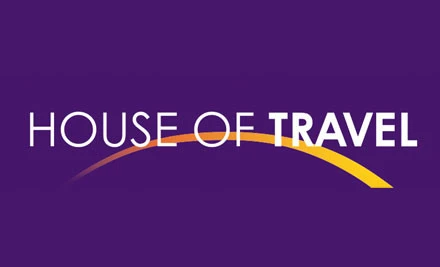
Are you looking for hassle-free way to explore the world? One of the most popular choices in New Zealand is House of Travel. This travel agency offers a wide range of options for travelers looking to experience top global destinations without the time-consuming tasks that often come with travel planning. In this post, we’ll explore how their services can help make your dream trip a reality. We’ll also cover the potential downsides of using a travel agency. Let’s go!
What is House of Travel?
House of Travel is New Zealand’s leading travel agency, offering an extensive selection of trips to some of the world’s top destinations. The company strives to make online booking and purchases easy, including the following categories:
- Holiday packages like ski holidays and all-inclusive
- Travel insurance
House of Travel wants customers to be able to find the best prices for the best experiences, without having to do the job of comparing manually. Thanks to their dedicated customer service, offers, and travel opportunities, it’s easy to see why House of Travel has become the go-to choice for many people looking for an enjoyable, and worry-free journey.
Face-to-face meetings with experts
One of the unique perks is that you can book a face-to-face video appointment, to receive expert advice when you plan and book your holiday from home.
Useful House of Travel app
The House of Travel app is another useful tool, offering maps, a currency converter, a countdown timer to your departure, a secure locker for travel documents, and much more.
Booking flights with House of Travel
What are the benefits of booking flights using House of Travel? One of the major perks is they can provide some of the lowest prices on airfare. The company has access to exclusive deals and discounts, which makes it easier to find bargains without having to spend hours searching for them. Plus, you’ll be able to book flights with multiple airlines at once instead of separately, saving time and money.
You can choose between return, one-way and domestic multi-city when you search for flights. You fill in where you wish to depart, and where you want to travel, as well as the departure and arrival dates. House of Travel also lets you select number of passengers, children, and infants, as well as your desired travel class like Economy or Business. You can read more about how to make your work-related trip smooth in our blog post “The best tips for making business travel smart” here .
Finding traveling deals – On sale with House of Travel
On the website, you will find an option in the menu called “On sale”. By navigating here, you can find a summary of the best packages right now. Here, you can find different holiday packages such as cruises, flights + hotel, ski holidays, and all-inclusive. You can sort by the different regions of the world, for example: Australia, Pacific Islands, Europe, and North America.
Are there any downsides?
One of the potential downsides of using a travel agency such as House of Travel when booking flights and trips is that they can, sometimes, end up more expensive than booking directly with airlines, hotels, and other companies. Additionally, since these are third-party services, you may have limited access to customer service should something go wrong after you have made your bookings. Furthermore, some of the discounts and offers may not always be the best option for your specific needs.
Is House of Travel recommended?
House of Travel is a highly recommended travel agency for various reasons. From exclusive offers to managing your bookings in the app. House of Travel has all the tools you need to plan your next adventure. Furthermore, their experienced travel agents can help tailor a trip that meets your needs, so you don’t have to worry about missing out on experiences.
Leave a Reply Cancel reply
Your email address will not be published. Required fields are marked *
Save my name, email, and website in this browser for the next time I comment.

IMAGES
COMMENTS
House of Travel offers travel insurance policies with Allianz Partners, a world leader in assistance and travel insurance. Find out why you need travel insurance, how to make a claim, and what to do in an emergency.
Here are some of the best travel credit cards of 2024: Flexibility, point transfers and a large bonus: Chase Sapphire Preferred® Card. No annual fee: Bank of America® Travel Rewards credit card ...
The Best Travel Insurance Companies. PrimeCover - Best for Evacuation. Travel Insured International - Best for Non-Medical Evacuation. WorldTrips - Great for Add-On Coverage. TravelSafe ...
House of Travel has partnered with Allianz to offer comprehensive insurance cover for its travel clients. House of Travel has eight travel insurance plans on offer: Plan A: Essentials Plus. Plan B: Premier. Plan C: Non-residents Incoming to New Zealand. Plan D: Permanent One-way From New Zealand. Plan E: Multi-trip. Plan F: Domestic Cancellation.
Best for emergency medical coverage. Allianz Global Assistance. Best for travelers with pre-existing medical conditions. Travel Guard by AIG. Best for those who pack expensive equipment. Travel ...
According to insurance comparison site Squaremouth, travelers in 2023 spent an average of $403 for comprehensive coverage, compared to $96 for medical-only policies. Comprehensive plans typically ...
leader in assistance services and travel insurance.Allianz Global Assistance has direct s. pport worldwide, from people who care about people. With 33 centres operating in 28 countries, Allianz Global Assista. ce Group has 10,000 employees looking out for you.Together we offer an unparalleled standar.
While buying travel insurance makes every trip cost slightly more than it otherwise would, this coverage can also lead to considerable financial savings. If you become injured in a remote location and require emergency transportation, you come down with a sudden illness or flight cancellations leave you stuck somewhere for days, benefits in ...
Note: The following companies are listed in alphabetical order. AIG Travel Guard - Best for Add-Ons. Allianz Travel - Best for Business Travel. Generali Global Assistance - Best for Emergency Support Services. HTH Travel Insurance - Best for Long-Term Insurance for International Travel. Nationwide - Best Cruise Travel Insurance.
A travel insurance policy typically costs between 4 and 10% of the overall price of your trip. The cost can vary: Plans with higher limits and more optional coverage cost more. A plan with a CFAR ...
For a single trip, multiple trips or long term. Covered by most policies. $15/25. IMG. Single trip or multiple trips (travel insurance and travel medical insurance options are available). Waived under set conditions for travel insurance; covered but capped for single-trip travel medical insurance. $17/$94.
Compare Quotes. Via Forbes Advisor's Website. The average cost of travel insurance is 4% to 6% of your trip costs, according to Forbes Advisor's analysis of travel insurance rates. For a $5,000 ...
The average travel insurance cost is $228 for a $5,000 trip, and the range of rates for insuring a $5,000 trip is from $154 for a basic policy up to $437 for a policy with generous coverage. Your ...
Best travel insurance companies. Best for trip delay: Faye. Best for lost baggage: AXA Assistance USA. Best for families: Travel Guard. Best for build-your-own coverage: American Express. Best for ...
Travel Insurance: An insurance product designed to cover the costs and losses, and reduce the risk associated with, unexpected events you might incur while traveling. It's often pitched as the ...
Polly Pocket is the host of the Airbnb, according to the listing.. Meet the 'Dream Besties':Barbie-launched dolls that have goals like owning a tech company How to book the Polly Pocket Airbnb ...
FILE - President Donald Trump pumps his fist after speaking in the East Room of the White House, early Wednesday, Nov. 4, 2020, in Washington. Trump is already laying a sweeping set of policy goals should he win a second term as president. ... Trump wants to reimpose his travel ban that originally targeted seven Muslim-majority countries and ...
Mr. Walz, a former teacher and football coach from Nebraska who served in the National Guard, was elected to the U.S. House of Representatives in 2006 and then as Minnesota's governor in 2018.
This means you'll need to at least know where you're going, when you're going and the cost of your trip before purchasing travel insurance. 🤓 Nerdy Tip. Multi-trip or annual travel ...
By Jimmy Rice, Money blog editor. The centre-point of a significant week in the economy was inflation data, released first thing on Wednesday, that showed price rises accelerated in July to 2.2%.
Get annual cover from under £11/year, or less for single-trip cover. If you've booked a holiday but not got travel insurance yet, DO IT NOW, DON'T DELAY. Half travel insurance's value is protecting you BEFORE travelling if something happens and stops you from going, as well as covering you on holiday. Find out what to watch out for, then use ...
The average cost of travel insurance for seniors is $417. However, seniors can likely expect to pay anywhere from $159 to $745 for a policy. Our team analyzed average travel insurance policy costs ...
House Of Travel. Open main menu. ... Leave your details and our team will provide you with the best quote for your travel insurance needs. Full Name. Phone Number. Email. Travel Dates. mm / dd / yyyy-mm / dd / yyyy. Submit. About Us Travel Services Luxury Travel Partners Insurance Awards Contact. Get in touch. Call +1 780 466 1951.
Zillow has 11 photos of this $292,000 1 bed, 1 bath, -- sqft townhouse home located at 615 Towne House UNIT 615, Islandia, NY 11749 built in 1969. MLS #3566009.
What is covered by travel insurance. Most plans typically cover a range of trip protections, including accidental death and dismemberment, baggage delay or loss, emergency medical coverage and ...
The Russian North Caucasus republic of Kabardino-Balkaria has low living standards, high unemployment, corruption and has had its share of violence, kidnappings and organised crime to contend with.
Travel insurance; House of Travel wants customers to be able to find the best prices for the best experiences, without having to do the job of comparing manually. Thanks to their dedicated customer service, offers, and travel opportunities, it's easy to see why House of Travel has become the go-to choice for many people looking for an ...
If you travel abroad frequently for business, and your primary concern is global health insurance, travel insurance plans from GeoBlue are worth checking out. The company specializes in ...
Categories: administrative territorial entity of Russia, city or town, big city, fortress, sloboda, capital city and locality. Location: Nalchik Urban Okrug, Kabardino-Balkaria, North Caucasus, Southern Russia, Russia, Eastern Europe, Europe. View on OpenStreetMap. Latitude. 43.477° or 43° 28' 37" north. Longitude. 43.5967° or 43° 35 ...
Kabardino-Balkaria is a hidden gem in the Caucasus Mountains, where you can find stunning landscapes, rich culture and delicious cuisine. In this video reel, I'll show you some of the best places to...